自考《大学英语自学教程》(上)课后练习例句汉译英(汉英对照)
- 格式:doc
- 大小:163.50 KB
- 文档页数:22
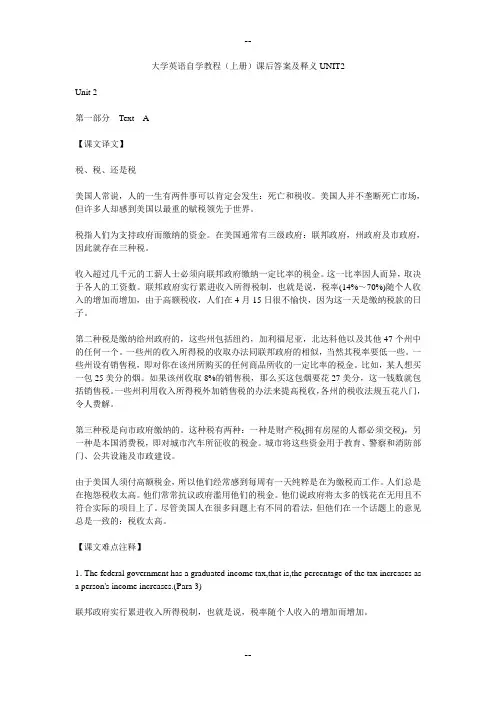
大学英语自学教程(上册)课后答案及释义UNIT2Unit 2第一部分Text A【课文译文】税、税、还是税美国人常说,人的一生有两件事可以肯定会发生:死亡和税收。
美国人并不垄断死亡市场,但许多人却感到美国以最重的赋税领先于世界。
税指人们为支持政府而缴纳的资金。
在美国通常有三级政府:联邦政府,州政府及市政府,因此就存在三种税。
收入超过几千元的工薪人士必须向联邦政府缴纳一定比率的税金。
这一比率因人而异,取决于各人的工资数。
联邦政府实行累进收入所得税制,也就是说,税率(14%~70%)随个人收入的增加而增加,由于高额税收,人们在4月15日很不愉快,因为这一天是缴纳税款的日子。
第二种税是缴纳给州政府的,这些州包括纽约,加利福尼亚,北达科他以及其他47个州中的任何一个。
一些州的收入所得税的收取办法同联邦政府的相似,当然其税率要低一些。
一些州设有销售税,即对你在该州所购买的任何商品所收的一定比率的税金。
比如,某人想买一包25美分的烟。
如果该州收取8%的销售税,那么买这包烟要花27美分,这一钱数就包括销售税。
一些州利用收入所得税外加销售税的办法来提高税收,各州的税收法规五花八门,令人费解。
第三种税是向市政府缴纳的。
这种税有两种:一种是财产税(拥有房屋的人都必须交税),另一种是本国消费税,即对城市汽车所征收的税金。
城市将这些资金用于教育、警察和消防部门、公共设施及市政建设。
由于美国人须付高额税金,所以他们经常感到每周有一天纯粹是在为缴税而工作。
人们总是在抱怨税收太高。
他们常常抗议政府滥用他们的税金。
他们说政府将太多的钱花在无用且不符合实际的项目上了。
尽管美国人在很多问题上有不同的看法,但他们在一个话题上的意见总是一致的:税收太高。
【课文难点注释】1.The federal government has a graduated income tax,that is,the percentage of the tax increases as a person's income increases.(Para 3)联邦政府实行累进收入所得税制,也就是说,税率随个人收入的增加而增加。
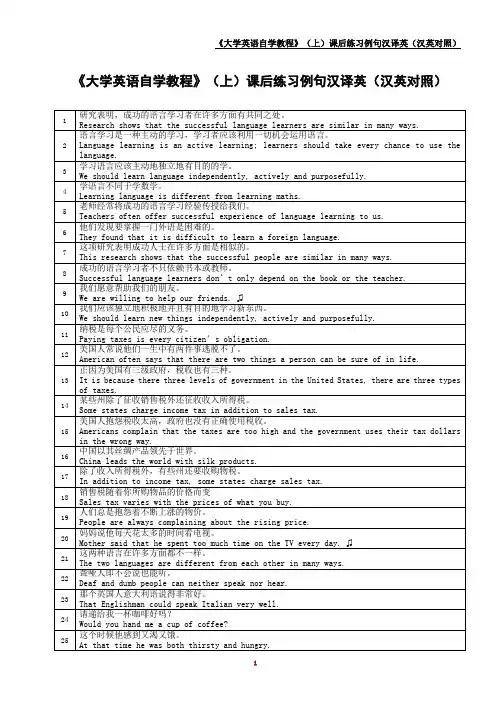
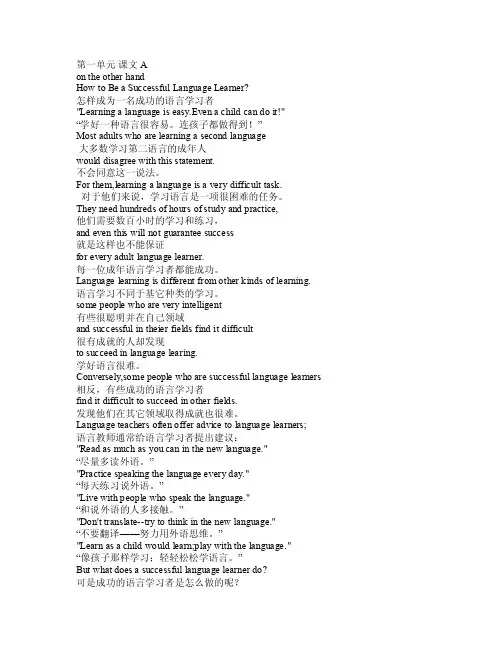
第一单元课文Aon th e oth er ha ndH ow to Be a Succ essfu l Lan guage Lear ner?怎样成为一名成功的语言学习者"Le arnin g a l angua ge is easy.Even a ch ild c an do it!"“学好一种语言很容易。
连孩子都做得到!”M ost a dults whoare l earni ng asecon d lan guage大多数学习第二语言的成年人wo uld d isagr ee wi th th is st ateme nt.不会同意这一说法。
Forthem,learn ing a lang uageis averydiffi culttask.对于他们来说,学习语言是一项很困难的任务。
The y nee d hun dreds of h oursof st udy a nd pr actic e,他们需要数百小时的学习和练习,andeventhiswillnot g uaran tee s ucces s就是这样也不能保证f or ev ery a dultlangu age l earne r.每一位成年语言学习者都能成功。
Lang uagelearn ing i s dif feren t fro m oth er ki nds o f lea rning. 语言学习不同于基它种类的学习。
somepeopl e who areveryintel ligen t有些很聪明并在自己领域andsucce ssful in t heier fiel ds fi nd it diff icult很有成就的人却发现to succ eed i n lan guage lear ing.学好语言很难。
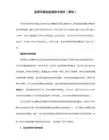
Text 11 successful [sək'sesfəl] a.成功的2 adult ['ædʌlt] n.成年人 a.成年的,成熟的3 disagree [disə'gri:] vi.(with)有分歧,不同意;不一致,不符4 statement ['steitmənt] n.声明,陈述5 guarantee [gærən'ti:] n./vt.保证,担保,保修6 intelligent [in'telidʒənt] a.聪明的,明智的7 conversely ['kɔnvə:sli] ad.相反地8 similar ['similə, 'simələ] a.相似的,类似的;与…相似(to)9 independent [indi'pendənt] a.独立的,自主的10 pattern ['pætn] n.型,模式,样式;花样,图案11 guesser n.猜测者12 clue [klu:] n.线索,提示13 conclusion [kən'klu:ʒən] n.结论,推论14 communicate [kə'mju:nikeit] vi.通讯,交流,交际 vt.传达,传播15 communication [kəmju:ni'keiʃən] n.通讯,交流;传达;通讯联系,交通工具16 inexact [inig'zækt] a.不正确的,不精确的17 incomplete [inkəm'pli:t] a.不完整的18 purpose ['pə:pəs] n.目的,意图;用途19 regularly ['regjuləli] ad.整齐地,经常地,定期地20 purposefully ['pə:pəsfuli] ad.有目的地,蓄意地21 technique [tek'ni:k] n.技术;技巧,手艺22 outline ['autlain] vt.概括,提出要点 n.轮廓;大纲,提纲23 disagree with 与…有分歧,不一致24 first of all 首先,第一25 depend on [di'pənd ɔn] 依赖,依靠;依…而定26 be willing to 愿意,乐意27 be interested in 对…感兴趣28 on the other hand 另一方面29 instance ['instəns] n.例,实例30 deaf [def] a.聋的;听力不佳的31 dumb [dʌm] a.哑的;无言的32 Englishman ['iŋgliʃmən] n.英国人33 Italian [i'tæliən] n.意大利人;意大利语34 waiter ['weitə] n.侍者,服务员35 beer [biə] n.啤酒36 soda-water n.苏打水,汽水37 traveler ['trævələ] n.旅客,旅游者38 macaroni [mækə'rəuni] n.通心粉39 primitive ['primitiv] a.原始的40 exact [ig'zækt] a.精确的,正确的41 consist [kən'sist] vi.组成(of)42 simply ['simpli] ad.仅,只;完全地;朴素地43 parrot ['pærət] n.鹦鹉44 not only...but also 不但…而且45 neither...nor 既不…也不46 consist of 由…组成47 Italy ['itəli] n.意大利Text 21 tax [tæks] n.税(款) vt.对…征税2 generally ['dʒenərəli] ad.一般地,通常,大体上3 federal ['fedərəl] a.联邦的4 type [taip] n.类型,种类,品种 vt./vi.打字5 salaried ['sælərid] a.拿薪水的,领工资的6 salary ['sæləri] n.工资 vt.[常用被动语态]给…发薪7 earn [ə:n] vt.挣得,赚得;获得,赢得8 percentage [pə'sentidʒ] n.百分比,百分率9 vary ['veəri] vi.变化,有不同,呈差异 vt.改变,使不同10 graduated a.(税)累进的;分等级的;刻度的;毕业的11 sale [seil] n.出售,卖;廉价出售12 charge [tʃɑ:dʒ] vt.索价;指控 n.价钱,费用;负荷13 item ['aitəm] n.条,条款,项目14 packet ['pækit] n.小包,小盒 vt.打包,装行李;包装15 cigarette [sigə'ret] n.香烟,纸烟16 figure ['figə] n.数字;人物;外形vt.(out)演算出;想出17 addition [ə'diʃən] n.加,加法;附加物18 revenue ['revinju:] n.(国家的)岁入,税收;收入,收益19 diverse [dai'və:s] a.不同的,相异的;多种多样的20 confuse [kən'fju:z] vt.使混乱,混淆21 property ['prɔpəti] n.财产,资产,所有物;性质,特性22 excise ['eksaiz] n.国产税;本国消费税23 fund [fʌnd] n.基金,专款;储备,贮存 vt.提供资金24 department [di'pɑ:tmənt] n.部,部门,系25 municipal [mju:'nisipəl] a.市的,市政的26 complain [kəm'plein] vt./vi.抱怨(of,about)27 protest [prə'test, 'prəutest] vt./vi.抗议,反对28 useless ['ju:sləs] a.无用的;无价值的;无效的29 impractical [im'præktikəl] a.不切实际的,不能实行的30 program ['prəugræm] n.=programme计划;程序;节目 vt.编程序31 view [vju:] n.看法,见解,观点;vt.看待,考虑,估量32 issue ['iʃu:, 'isju:] n.问题;(书刊的)期号 vt.发行,颁布,出版33 tend [tend] vi.易于,往往会;倾向于 vt.照管,护理34 be sure of 确信…;确定…35 have a corner on 垄断(某物)=to have a(the) corner (on)36 similar to 跟…类似的,与…同样的37 in addition to 加之;又;除…之外;并且38 tend to 倾向,有…的趋势,趋于39 California [kæli'fɔ:njə] 加利福尼亚(美国州名)40 North Dakota 北达科他(美国州名)41 advertise ['ædvətaiz] vt./vi.为…做广告;登广告42 attract [ə'trækt] vt.吸引,引起…的注意43 design [di'zain] vt./vi.设计;预定,指定 n.设计;图案44 mail [meil] n.邮件,邮递 vt.邮寄45 constantly ['kɔnstəntli] ad.经常地;不断地;时常地46 product ['prɔdʌkt] n.产品,产物47 persuade [pə'sweid] vt.说服,劝服;使相信 a.空闲的;有闲的48 leisure ['leʒə] n.空闲时间,空暇;悠闲,安逸49 activity [æk'ti viti] n.活动,活跃;行动50 classified ['klæsifaid] a.分类的,被归为一类的;保密的,机密的51 edition [i'diʃən] n.版,版本52 section ['sekʃən] n.章节,部分;部门,科;截面,剖面53 announcement [ə'naunsmənt] n.通告,布告,告示54 available [ə'veiləbəl] a.可利用的,可获得的55 amount [ə'maunt] n.数量,数额,总数 vi.合计,共计56 display [di'splei] n./vt.陈列,展览;显示57 entertainment [entə'teinmənt] n.娱乐,游艺,技艺表演;招待,款待58 audience ['ɔ:diəns] n.听众,观众,读者59 limited ['limitid] a.有限的60 attractive [ə'træktiv] a.有吸引力的,引起注意的61 characteristic [kæriktə'ristik] a.特有的,典型的 n.特性,特征62 slogan ['sləugən] n.标语,口号63 identify [ai'dentifai] vt.认出,鉴定;认为…等同于(with)64 commercial [kə'mə:ʃəl] a.商业的,商务的 n.商业广告65 department [di'pɑ:tmənt] n.部,部门,系66 responsible [ri'spɔnsəbəl] a. 需负责的,承担责任的;责任重大的67 company ['kʌmpəni] n.公司;同伴,陪伴68 particular [pə'tikjulə] a.特定的;特殊的,特别的 n.详情,细节69 estimate ['estimət, 'estimeit] n.估计,估价;评价 vt.估计,估价70 management ['mænidʒmənt] n.管理,经营;管理部门;资方71 approve [ə'pru:v] vt.赞成,同意;批准,核准72 involve [in'vɔlv] vt.使卷入,使参与(in);牵涉;包含,含有73 for the most part 在很大程度上,多半74 be characteristic of 为…所特有,是…的特征75 catch the eye 引人注目76 no more than 仅仅77 identify...with 把…和…等同起来78 carry over 继续下去,遗留下来79 as well as 除…之外(也);和80 over and over 反复81 put up with [put 'ʌp wið] 忍受,容忍82 be responsible for 对…负责任的;对…承担责任的83 decide on 决定,选定84 be involved in 与…有关联,参与,介入Text 31 sailor ['seilə] n.水手,海员2 unwilling [ʌn'wiliŋ] a.不情愿的,不愿意的3 equator [i'kweitə] n.赤道4 km n.(=kilometer)公里;千公尺5 bulge [bʌldʒ] n.不规则突起;鼓起之处6 unusual [ʌn'ju:ʒuəl] a.不寻常的,与众不同的7 salty ['sɔ:lti, 'sɔlti] a.含盐的,咸的8 average ['ævəridʒ] n.平均数,平均 a.平均的;平常的 v.平均9 spot [spɔt] n.地点,处所;点 vt.点缀;认出,准确定位10 range [reindʒ] n.山脉;幅度,范围 vi.变化 vt.排列成行11 peak [pi:k] n.山峰;顶点12 mid-Atlantic a.大西洋中部的13 eastward ['i:stwəd] a.向东的 ad.向东14 vessel ['vesəl] n.船,舰;容器,器皿15 crew [kru:] n.全体船员,全体机务人员16 becalm [bi'kɑ:m] vt.因无风而停止前进;使平静,使安静17 gulf [gʌlf] n.海湾18 stream [stri:m] n.小河,溪流 vi.流,涌19 current ['kʌrənt] n.潮流;涌流,电流 a.当前的,通行的20 affect [ə'fekt] vt.影响,打动21 climate ['klaimit] n.气候22 flow [fləu] vi.流动 n.流23 furnish ['fə:niʃ] vt.供应,提供;装备,(用家具)布置24 fishing ['fiʃiŋ] n.捕鱼,钓鱼25 region ['ri:dʒən] n.地区,区域26 highway ['haiwei] n.公路;(水陆)交通干线27 iceberg ['aisbə:g] n.冰山28 float [fləut] vi./vt.(使)漂浮29 steamship ['sti:mʃip] n.汽船,轮船30 airplane ['eəplein] n.飞机31 separate...from 使从…分离(分开,隔开)32 on average 根据平均标准;平均而言33 pile up 累积;(指若干车辆)碰撞在一起34 Atlantic [ət'læntik] 大西洋(=the Atlantic Ocean)35 America [ə'merikə] 美洲(前边加定冠词the)36 Pacific [pə'sifik] 太平洋(=the Pacific Ocean)37 Columbus [kə'lʌmbəs] 哥伦布(意大利航海家,新大陆发现者)38 Puerto Rico ['pwertəu 'ri:kɔ:] 波多黎各(美国的一个自由联邦,实行自治)39 Azores [ə'zɔ:z] 亚速尔群岛40 Florida ['flɔridə] 佛罗里达(美国州名)41 Sargasso Sea 马尾藻海(在西印度群岛东北)42 Gulf Stream 墨西哥湾流43 Labrador ['læbrədɔ:] 拉布拉多半岛(加拿大地名)44 Arctic ['ɑ:ktik] 北极(the Arctic北极北区;北冰洋)45 Grand Banks 大浅滩(纽芬兰岛东南的大西洋浅滩)46 Newfoundland [nju:fənd'lænd] 纽芬兰(加拿大岛或省名)47 remain [ri'mein] vi.仍然是,依旧是;剩下,余留48 observation [ɔbzə'veiʃən] n.注意,观察;观察物49 continually [kən'tinjuəli] ad.不停地,频频地50 gravitational [grævi'teiʃənl] a.吸引作用的,万有引力的,地心引力的51 diameter [dai'æmitə] n.直径52 disc [disk] n.圆盘;唱片,磁盘53 artist ['ɑ:tist] n.艺术家,美术家54 merely ['miəli] ad.仅仅,只不过 no more than55 reflect [ri'flekt] vt.反射,反映 vi.思考,考虑(on,upon)56 absolutely ['æbsəlu:tli] ad.完全地,绝对地;肯定地57 uncomfortably [ʌn'kʌmftəbli] ad.不舒适地,不安地58 inhabitant [in'hæbitənt] n.居民,住户59 earthlight n.地球光60 moonlight ['mu:nlait] n.月光61 lunar ['lu:nə] a.月亮的62 occasionally [ə'keiʒənəli] ad.偶尔地,间或63 sunlight ['sʌnlait] n.日光,太阳光64 except for 除了…外;除去;撇开65 keep...in mind 记住66 light up 使明亮,发亮67 speak of 谈起,提到Text 41 psychological [saikə'lɔdʒikəl] a.心理(学)的2 focus ['fəukəs] vt./vi.(使)聚焦,(使)集中 n.焦点,中心3 basic ['beisik] a.基本的,基础的4 principle ['prinsəpl] n.原理,原则;主义,信念5 meaningfulness n.富有意义6 organization [ɔ:gənai'zeiʃən] n.组织;团体,机构7 association [əsəusi'eiʃən] n.联合,结合,交往;协会,社团8 visualization n.想像,设想9 meaningful ['mi:niŋfəl] a.富有意义的,意味深长的10 rhyme [raim] n.韵,押韵11 ability [ə'biliti] n.能力,能耐12 random ['rændəm] a./ad.胡乱的,任意的,随便的 n.无目标13 organize ['ɔ:gənaiz] vt.组织14 jumble ['dʒʌmbəl] vt./vi.混杂15 chunk [tʃʌŋk] n.一大块,一厚块 vt.分块,组块16 easily ['i:zili] ad.容易地17 categorize ['kætigəraiz] n.分类18 following ['fɔləuiŋ] a.接着的,下列的19 category ['kætigəri] n.门类,种类;范畴;部门20 needless ['ni:dləs] a.不需要的,不必要的21 refer [ri'fə:] vi.提到,涉及;查阅 vt.把…归类于22 relate [ri'leit] vi.有关联 vt.讲述;使互相关联23 accurately ['ækjuritli] ad.准确地,精确地24 memorize ['meməraiz] vt.熟记,记住25 associate [ə'səuʃieit] vt.把…联系在一起;交往 n.同事 a.副的26 improvement [im'pru:vmənt] n.改进,增进27 visualize ['vizjuəlaiz] vt.想像,设想28 imagery ['imidʒəri] n.写作中直喻或比喻的使用;意象29 repetition [repi'tiʃən] n.重复,反复;背诵30 integrated ['intigreitid] a.成整体的,完全的,完整的31 image ['imidʒ] n.像,形象,映象,图像32 mental ['mentl] a.智力的,脑力的;精神的,思想上的33 preserve [pri'zə:v] vt.保护,维持;保存,保藏34 focus on 集中35 make sense 有意义36 make a difference 有影响,起(重要)作用37 needless to say 不用说38 refer to [rifə: tu:] 提到,涉及;参考,查阅39 relate...to 与…有关系40 associate...with 把…联系在一起;与…常在一起,与…为友41 Mount Fuji 富士山42 Japan [dʒə'pæn] 日本43 short-term a.短期的44 long-term a.长期的45 recall [ri'kɔ:l] vt.回忆,回想;召回;撤消,收回46 contrast ['kɔntrɑ:st] n.对比,对照 vi.形成对比 vt.把…与…对比47 dial ['daiəl] vt./vi.拨,打电话 n.表面;标度盘48 interrupt [intə'rʌpt] vt.打断,打扰;阻碍 vi.打断,打扰49 unable [ʌn'eibəl] a.[后接动词不定式]不能的,不会的50 psychologist [sai'kɔlədʒist] n.心理学家51 human ['hju:mən] a.人的,人类的 n.人52 apparatus [æpə'reitəs] n.器械,器具,设备53 rat [ræt] n.鼠54 release [ri'li:s] n./vt.释放;发布,发行;放开,松开55 reward [ri'wɔ:d] n./vt.酬劳,奖赏;报答56 interval ['intəvəl] n.间隔,间距;幕间(或工间)休息57 represent [repri'zent] vt.作为…代表(或代理);表示;表现58 intermediate [intə'mi:diət] a.中间的;中级的59 advanced [əd'vɑ:nst] a.先进的,高级的60 native-speaking a.说本族语的,讲本国话的61 recording [ri'kɔ:diŋ] n.录制(尤指广播,电视等)节目62 speaker ['spi:kə] n.说话者,演讲者;扬声器63 paragraph ['pærəgrɑ:f] n.(文章的)段落,节64 alike [ə'laik] a.同样的,相像的65 wither ['wiðə] vt./vi.(使)枯萎,凋谢66 method ['meθəd] n.方法,办法67 system ['sistəm] n.系统,体系;制度,体制68 unrelated [ʌnri'leitid] a.无关的,不相关的69 proficiency [prə'fiʃənsi] n.[U]熟练,精通70 in contrast 成对比71 look up 在字典、参考书中查找72 be unable to 不能做某事73 turn on [tə:n ɔn] 开,接通(水源,电源,煤气等)74 turn off 关,关断(水源,电源,煤气等)75 to begin 首先,开始76 Los Angeles [lɔs'ændʒili:z] 洛杉矶(美国加州西南一港市)Text 51 fallacy ['fæləsi] n.谬见,错误的信念;谬误的推理,谬论2 quality ['kwɔliti] n.质量;品质,特性3 deer [diə] n.[单复同形]鹿4 savage ['sævidʒ] a.野蛮的,未开化的;凶猛的,残酷的5 tribe [traib] n.种族,部落;(植物,动物)族,类6 bravery ['breivəri] n.[U]英勇,勇敢;勇气7 man-eating n./a.食人;食人的8 eager ['i:gə] a.热切的,渴望的9 civilized ['sivilaizd] a.文明的,开化的10 ginger ['dʒindʒə] n.生姜,姜11 root [ru:t] n.根(部);根源 v.(使)生根,(使)扎根12 magical ['mædʒikəl] a.魔术的,似魔术的;不可思议的,迷人的13 poisonous ['pɔizənəs] a.有毒的14 overseas [əuvə'si:z] ad.海外,国外 a.(在)海外的,(在)国外的15 widespread ['waidspred] a.分布(或散布)广的,普遍的16 muscle ['mʌsəl] n.肌肉;力量,实力17 chew [tʃu:] vt./vi.咀嚼18 helpful ['helpfəl] a.给予帮助的,肯帮助的;有益的,建设性的19 digestive [di'dʒestiv] a.消化(食物)的20 juice [dʒu:s] n.汁,液21 digest [di'dʒest 'daidʒest] vt.消化 n.文摘22 foundation [faun'deiʃən] n.根据;基金会;基础,地基23 mixture ['mikstʃə] n.混合;混合物24 belief [bi'li:f] n.相信;信念,信仰25 acid ['æsid] n.酸,酸性物质 a.酸的26 curdle ['kə:dl] vi./vt.(使)结成凝乳;变成凝乳状27 indigestible [indi'dʒestəbəl] a.难消化的;不能消化的28 digestion [di'dʒestʃən] n.消化;吸收29 cream [kri:m] n.奶油,奶油色30 combination [kɔmbi'neiʃən] n.结合,联合;化合,化合物31 protein ['prəuti:n] n.蛋白质32 carbohydrate [kɑ:bəu'haidreit] n.碳水化合物;[pl.]淀粉质食物33 chiefly ['tʃi:fli] ad.大半,主要34 contain [kən'tein] vt.包含,容纳35 be eager to 热切想做,渴望要做36 substitute for …的替代物37 have...to do with 与…有关38 as a matter of fact 事实上,其实;事实恰恰相反39 think of...as 把…看成40 insect ['insekt] n.昆虫41 ant [ænt] n.蚂蚁42 hardworking ['ha:d'wə:kiŋ] a.努力工作43 wrestle ['resəl] vi.角力;摔交 n.角力或摔交比赛44 mock [mɔk] vt./vi.愚弄,嘲弄 a.假的,模拟的45 engage [in'geidʒ] vi.(in)从事于,参加 vt.使从事于,使忙于46 sober ['səubə] a.冷静的,镇定的;认真的,严肃的47 frog [frɔg] n.蛙48 grave [greiv] a.严重的;严肃的,庄重的 n.坟墓49 owl [aul] n.猫头鹰50 nest [nest] n.巢,窝51 beaver ['bi:və] n.海狸52 dam [dæm] n.坝,堤53 arrange [ə'reindʒ] vt.安排,筹划;整理,排列54 plaster ['plɑ:stə] vt.粘贴;涂灰泥于(墙等) n.灰泥,石膏55 mud [mʌd] n.泥,泥浆56 spider ['spaidə] n.蜘蛛57 scarcely ['skeəsli] ad.几乎不,几乎没有58 creature ['kri:tʃə] n.生物,动物;人59 imitate ['imiteit] vt.模仿,仿效;仿制,仿造60 shepherd ['ʃepəd] n.牧羊人61 improvement [im'pru:vmənt] n.改进,增进62 fashion ['fæʃən] n.方式,样子;流行式样63 instinct ['instiŋkt] n.本能,直觉;生性,天性64 hut [hʌt] n.小屋,棚屋65 cage [keidʒ] n.笼66 variety [və'raiəti] n.变化,多样化;品种;多种多样67 boot [bu:t] n.靴68 etc. [et'setərə] (=et cetera)[缩][拉]以及其他,等等69 wit [wit] n.智力,才智70 unlike [ʌn'laik] prep.不像…,和…不同 a.不相似的,不同的71 a great deal 大量,许多72 be true with 对…一样,对…也是真的73 engage in 从事,忙于74 be true of 对…一样,对…也是真的75 as if 好像,似乎,仿佛76 search for 搜寻,搜查,探察77 take care of 爱护;照顾,照料;处理,对付Text 61 rare [reə] a.稀有的,难得的2 substance ['sʌbstəns] n.物质;实质,本质;主旨,大意3 slight [slait] a.轻微的,纤细的4 carbon ['kɑ:bən] n.碳5 extreme [ik'stri:m] a.极端的;末端的 n.极端6 pressure ['preʃə] n.压力,压强7 liquid ['likwid] a.液体的,液态的 n.液体8 molten ['məultən] a.(指金属)熔化的9 crack [kræk] n.裂缝,裂口 vi.爆裂,破裂10 crust [krʌst] n.地壳;面包皮,硬外皮,外壳11 crystal ['kristəl] n.水晶;晶粒 a.清澈透明的,晶体的12 popular ['pɔpjulə] a.流行的,通俗的,大众的;受欢迎的13 gem [dʒem] n.宝石,珠宝14 handful [hændful] n.一把,一小撮15 gravel ['grævəl] n.碎石,砂砾16 formation [fɔ:'meiʃən] n.[地]岩层;形成,构成17 pipe [paip] n.管子,导管;烟斗 vt.用管道输送18 volcano [vɔl'keinəu] n.火山19 somewhat ['sʌmwɔt] ad.稍微,有点20 blast [blɑ:st] n.疾风,强风;爆炸 vt.炸,炸掉21 elevator ['eliveitə] n.电梯,升降机22 crush [krʌʃ] vt.压碎,碾碎;镇压,压倒23 destroy [di'strɔi] vt.破坏,毁灭;消灭24 grease [gri:s] n.油脂;滑脂25 impressive [im'presiv] a.给人印象深刻的,感人的26 greasy ['gri:si] a.涂有油脂的,油污的;油腻的,滑的27 pebble ['pebəl] n.小圆石;卵石28 experienced [ik'spiəriənst] a.有经验的29 miner ['mainə] n.矿工30 immediately [i'mi:diətli] ad.立即地,即刻地;直接地,紧密地31 be made of 由…构成32 be popular with 受…喜欢;受…欢迎33 run out [rʌn 'aut] 用尽34 sort out 分类,整理35 stick to 附着,粘住36 India ['indiə] 印度37 Brazil [brə'zil] 巴西38 Russia ['rʌʃə] 俄罗斯39 South Africa [sauθ'æfrikə] 南非40 beneath [bi'ni:θ] prep.在…下面(或底下),低于41 haze [heiz] n.薄雾42 morning-glory n.牵牛花43 aside [ə'said] ad.在旁边,到(或向)一边44 magnify ['mægnifai] vt.放大;扩大,夸大45 puzzle ['pʌzl] vt./vi.(使)迷惑,(使)为难 n.谜,难题46 seed [si:d] n.种子47 observe [əb'zə:v] vt.注意到,察觉到;观察;遵守,奉行48 seaweed ['si:wi:d] n.海草;海藻49 former ['fɔ:mə] a.在前的,以前的 n.前者50 latter ['lætə] a.后者的;后一半的,接近终了的 n.后者51 inorganic [inɔ:'gænik] a.无机的52 dwelling ['dweliŋ] n.住处;住宅53 fairy ['feəri] n.神仙,仙人54 broad [brɔ:d] a.宽的,阔的;广泛的55 delicious [di'liʃəs] a.美味的;(味觉或嗅觉)使人愉快的56 closely ['kləusli] ad.紧密地;严密地,密切地57 suck [sʌk] v.吸,吸收58 sap [sæp] n.树液;元气,精气59 dissolve [di'zɔlv] vt.(使)溶解,(使)融化;解散,取消60 turn aside from 离开61 be satisfied with 对…感到心满意足62 take place 发生63 lie in 在于64 hold good for (对…)适用65 live on 靠…生活66 take in 吸收;让…进入;接纳,接受67 suck up 吸收,吸出,吸起68 take up 拿起;吸收,溶解;占去Text 71 definition [defi'niʃən] n.定义,释义2 marriage ['mæridʒ] n.结婚,婚姻3 descend [di'send] vi.传下,遗传;下来,下降4 ancestor ['ænsəstə] n.祖先,祖宗5 household ['haushəuld] n.家庭,户 a.家庭的,家常的6 grandparent ['grænpeərənt] n.(外)祖父或(外)祖母7 relative ['relətiv] n.亲属,亲戚 a.相对的8 traditional [trə'diʃənəl] a.传统的9 security [si'kjuəriti] n.安全10 basically ['beisikəli] ad.基本上,从根本上说11 nuclear ['nju:kliə] a.核子的,核能的;核心的,中心的12 extended [iks'tendid] a.展开的;延伸的,延续的;广泛的13 nucleus ['nju:kliəs] n.(原子)核;核心14 mother-in-law n.岳母;婆母15 agricultural [ægri'kʌltʃər(ə)l] a.农业的16 industrial [in'dʌstriəl] a.工业的,产业的17 industrialize [in'dʌstriəlaiz] vt.(使)工业化18 post-industrial a.后工业化的19 earner ['ə:nə] n.赚钱者;获得收入者20 split [split] vi.撕裂;分裂 vt.劈开 n.分裂,裂口21 divorce [di'vɔ:s] n./vi.离婚 vt.与…离婚,使分裂22 social ['səuʃəl] a.社会的;交际的,社交的23 remarry [ri:'mæri] vt./vi.(使)再婚24 care for ['keəfɔ:] 喜欢,对…中意;对…担心;照顾,照料25 split up [split 'ʌp] 分裂,分开;吵架,离婚26 talk of 谈到,谈起27 structure ['strʌktʃə] n.结构,构造;建筑物 vt.建造,建立28 generation [dʒenə'reiʃən] n.一代(人);产生,发生29 customary ['kʌstəməri] a.习惯上的,惯常的;合乎习俗的30 partner ['pɑ:tnə] n.配偶;搭档,伙伙,合伙人31 similarity [simi'læriti] n.相似,类似32 role [rəul] n.角色;作用33 similarly ['similəli] ad.相似地,类似地34 physical ['fizikəl] a.身体的;物理的;物质的,有形的35 emotional [i'məuʃənəl] a.感情的,情绪的36 provider [prə'vaidə] n.供应者;提供者;养家糊口的人37 housework ['hauswə:k] n.家务劳动;家事38 preparation [prepə'reiʃən] n.准备,预备39 pregnant ['pregnənt] a.怀孕的,妊娠的40 primary ['praiməri] a.初级的;首要的,主要的,基本的41 preschool [pri:'sku:l] a.学龄前的,入学前的42 baby-sitter ['bebisitə] n.代人临时照看小孩的人43 dependent [di'pendənt] a.依靠的,依赖的(on,upon)44 provide for 赡养,为…提供必需品45 in addition [inə'diʃən] 另外,加之46 give up [giv 'ʌp] 交出,让出;放弃,抛弃,辞去47 instead of [in'sted] 代替;而不是…48 be busy doing 忙于做(某事)49 in conclusion 最后,在结束时Text81 telecommunication [telikəmju:ni'keiʃən] n.电信,远距离通信2 via ['vaiə] prep.经由,经过,通过3 satellite ['sætəlait] n.卫星,人造卫星4 transmit [trænz'mit, træns-] vt.播送,发射;传送,传递;输送5 photography [fə'tɔgrəfi] n.摄影,照相;摄影术6 telegraph ['teligrɑ:f] n.电报(机) vt.用电报发送 vi.打电报7 establish [i'stæbliʃ] vt.建立,创办,设立;确立,使确认8 signal ['signəl] n.信号,暗号 vt./vi.(向…)发信号9 orbit ['ɔ:bit] vt./vi.绕(…的)轨道运行 n.轨道10 visual ['viʒjuəl] a.视觉的,看得见的11 capable ['keipəbəl] a.有能力的,有才能的;能…的(of)12 broadcast ['brɔ:dkɑ:st] n./vt./vi.广播,播音13 computer [kəm'pju:tə] n.计算机,电脑14 theory ['θiəri] n.理论,原理;学说15 access ['ækses] n.通道,入口;接近(或进入)的机会16 unlimited [ʌn'limitid] a.无界限的,无边际的;无限制的;无数的17 demonstrate ['demənstreit] vt.说明,演示;论证,证实 vi.示威游行18 educational [edju'keiʃənəl] a.教育的,教育方面的;有教育意义的19 remote [ri'məut] a.遥远的,偏僻的;(可能性)很小的20 isolate ['aisəleit] vt.使隔离,使孤立 a.孤立的21 transportation [trænspɔ:'teiʃən] n.运输;运输系统,运输工具22 instruction [in'strʌkʃən] n.教学,指导;命令,指示,用法说明23 conversation [kɔnvə'seiʃən] n.谈话,会话24 simultaneously [siməl'teinjəsli] ad.同时发生地,同时进行地25 channel ['tʃænəl] n.频道;航道;渠道 vt.通过…获得,传送26 risk [risk] vt.冒…的危险 n.冒险,风险27 privacy ['praivəsi, -pri] n.私事,私生活;隐私;独处28 personal ['pə:sənəl] a.个人的,私人的;亲自的29 movie ['mu:vi] n.电影30 contact ['kɔntækt] n.接触,联系 vt.与…接触,使联系31 technology [tek'nɔlədʒi] n.工艺,技术32 harm [hɑ:m] n./vt.伤害,损害,危害33 expert ['ekspə:t] n.专家,能手 a.熟练的,内行的34 application [æpli'keiʃən] n.申请,申请表;应用,实施35 be capable of (指人)有某种能力或倾向的36 have access to 可接近,可进入37 lead to 导致;通向38 Olympic Games 奥林匹克运动会39 Tokyo ['təukjəu] 东京40 Olympics [əu'limpiks] 奥林匹克运动会比赛项目(=Olympic Games)41 obvious ['ɔbviəs] a.显然的,明显的42 widely ['waidli] ad.广泛地,普遍地;广博地;大大地43 shelter ['ʃeltə] n.掩蔽,保护;掩蔽处 vt.掩蔽,庇护44 atmosphere ['ætməsfiə] n.大气,大气层;周围环境,气氛45 deadly ['dedli] a.致死的,致命的46 ray [rei] n.光线,射线47 atmospheric [ætməs'ferik] a.大气的,空气的;大气层的;大气所引起的48 automobile ['ɔ:təməbi:l] n.汽车49 tire ['taiə] n.(=tyre)轮胎50 gas [gæs] n.气体;煤气;汽油51 per [pə:] prep.每,每一52 column ['kɔləm] n.柱,圆柱;栏,专栏(文章)53 electrical [i'lektrikəl] a.电的,电气的54 existence [ig'zistəns] n.存在;生存,生活55 gaze [geiz] vi./n.凝视,注视56 lightning ['laitniŋ] n.闪电57 thorough ['θʌrə] a./ad.彻底的,完全的;周到的,精心的58 radar ['reidɑ:] n.雷达59 create [kri:'eit] vt.创造;创作;引起,产生60 hydrogen ['haidrədʒən] n.氢61 curve [kə:v] n.曲线,弯曲 vt./vi.(使)弯曲,(使)成曲线62 unending [ʌn'endiŋ] a.永无止境的,不尽的;不断的,不停的63 meantime ['mi:ntaim] n.同时,其间64 element ['elimənt] n.成分,要素;元素65 atomic [ə'tɔmik] a.原子能的;原子的66 explosion [ik'spləuʒən] n.爆炸,爆发67 in order to 为了68 protect...from 防御(危险;敌人等)69 rest upon 依赖,依靠70 in the meantime 在此期间,(与此)同时71 pay attention to 注意72 Sydney Chapman 西德尼·查普曼(人名)Text91 scientific [saiən'tifik] a.科学的2 attitude ['ætitju:d] n.姿势,姿态;态度,看法3 environment [in'vaiərənmənt] n.环境,周围状况,自然环境4 curiosity [kjuəri'ɔsiti] n.好奇(心);求知欲5 imagination [imædʒi'neiʃən] n.想像,想像力;空想,幻觉6 apart [ə'pɑ:t] ad.分离,分开7 stimulate ['stimjuleit] vt.刺激,激励8 scientifically ad.科学地9 relationship [ri'leiʃənʃip] n.关系,联系10 phenomenon [fi'nɔminən] n.(phenomena)现象,迹象11 unknown [ʌn'nəun] a.未知的,不知名的12 open-minded a.无偏见的;虚心的13 open-mindedness n.无偏见;虚心14 regardless [ri'gɑ:dləs] a.不注意的;不关心的 ad.不论如何,不顾15 previously ['pri:viəsli] ad.在前地,早先地16 disagreeable [disə'gri:əbl] a.让人讨厌的,不合心意的17 unpleasant [ʌn'plezənt] a.使人不愉快的;不合意的18 failure ['feiljə] n.失败;故障;没做到,不履行19 solution [sə'lu:ʃən] n.解答,解决办法;溶解,溶液20 thinking ['θiŋkiŋ] n.思想,思考;想法,见解21 adapt [ə'dæpt] vt.使适应,使适合;改编 vi.适应(to)22 perfect ['pə:fikt, pə'fekt] a.完美的,完满的;完全的 vt.使完美,改善23 acceptable [ək'septəbəl] a.可以接受的24 entirely [in'taiəli] ad.全部地,完整地;完全地,彻底地25 frequently ['fri:kwəntli] ad.经常地,频繁地26 evidence ['evidəns] n.根据,证据27 finding ['faindiŋ] n.发现(物);[常pl.](调查或研究)结果28 sprout [spraut] vi.发芽,抽条 vt.使发芽 n.新芽,嫩苗29 determine [di'tə:min] vt.决定;查明,确定;决心30 growth [grəuθ] n.增长,增加;生长,发展31 lay aside 把…放在一边,把…搁置一旁;留存32 take apart 拆散;拆开33 carry out ['kæri-aut] 实行;完成34 believe in 相信,信任35 regardless of 不顾,不管36 in advance 预先,事先;在前面37 adapt...to 使…适应…38 make up one's mind 下决心39 once and for all 永远地,一劳永逸地40 in the light of 按照,根据;鉴于41 respect for 尊重42 laugh at 嘲笑;讥笑43 Benjamin Franklin 富兰克林(美国政治家及科学家)44 Thomas Edison 爱迪生(美国发明家)45 Galileo [gæli'leiəu] 伽利略(意大利物理学家及天文学家)46 Louis Pasteur 巴斯德(法国化学家及微生物学家)47 solve [sɔlv] vt.解决,解答48 arouse [ə'rauz] vt.引起,激起;唤起,唤醒49 procedure [prə'si:dʒə] n.程序,手续,步骤50 obtain [əb'tein] vt.获得,得到51 solution [sə'lu:ʃən] n.解答,解决办法;溶解,溶液52 arise [ə'raiz] vi.出现,发生;(from)由…引起53 biological [baiə'lɔdʒikəl] a.生物学(上)的54 engineering [endʒi'niəriŋ] n.工程,工程学;操纵,管理55 microelectronics [maikrəui:lek'trɔniks] n.微电子学,超小型电子学56 account [ə'kaunt] n.叙述,说明;帐户 vi.说明(原因等)57 related [ri'leitid] a.有关的,相关的(to);有亲戚关系的58 background ['bækgraund] n.背景59 logical ['lɔdʒikəl] a.逻辑(上)的,符合逻辑的60 mathematical [mæθə'mætikəl] a.数学(上)的61 analysis [ə'næləsis] n.([复]analyses)分析;分解62 unanswered [ʌn'ɑ:nsəd] a.未予答复的;无响应的,无报答的63 indicate ['indikeit] vt.指示,指出;表示,表明64 inference ['infərəns] n.推论,推理,推断65 hypothesis [hai'pɔθisis] n.假说,假设;(无根据的)猜测,揣测66 prediction [pri'dikʃən] n.预言,预计;预报67 confidence ['kɔnfidəns] n.信任,信心68 probable ['prɔbəbəl] a.很可能的,大概的69 unreliable [ʌnri'laiəbl] a.不可靠的,靠不住的;不可信赖的70 modify ['mɔdifai] vt.修改,更改71 accurate ['ækjurət] a.准确的,精确的72 variable ['veəriəbəl] n.变量 a.易变的,可变的;变量的73 experimentation [eksperimen'teiʃən] n.实验,试验74 a variety of 种种;若干不同的75 result from 发生;因…引起,起因于76 in need of 需要77 build up 建立,逐步树立;加强78 carry out ['kæri-aut] 实现,进行;贯彻,执行79 turn out to be 原来是,(最后)证明是80 check with 与…相符,一致Text101 scientific [saiən'tifik] a.科学的2 attitude ['ætitju:d] n.姿势,姿态;态度,看法3 environment [in'vaiərənmənt] n.环境,周围状况,自然环境4 curiosity [kjuəri'ɔsiti] n.好奇(心);求知欲5 imagination [imædʒi'neiʃən] n.想像,想像力;空想,幻觉6 apart [ə'pɑ:t] ad.分离,分开7 stimulate ['stimjuleit] vt.刺激,激励8 scientifically ad.科学地9 relationship [ri'leiʃənʃip] n.关系,联系10 phenomenon [fi'nɔminən] n.(phenomena)现象,迹象11 unknown [ʌn'nəun] a.未知的,不知名的12 open-minded a.无偏见的;虚心的13 open-mindedness n.无偏见;虚心14 regardless [ri'gɑ:dləs] a.不注意的;不关心的 ad.不论如何,不顾15 previously ['pri:viəsli] ad.在前地,早先地16 disagreeable [disə'gri:əbl] a.让人讨厌的,不合心意的17 unpleasant [ʌn'plezənt] a.使人不愉快的;不合意的18 failure ['feiljə] n.失败;故障;没做到,不履行19 solution [sə'lu:ʃən] n.解答,解决办法;溶解,溶液20 thinking ['θiŋkiŋ] n.思想,思考;想法,见解21 adapt [ə'dæpt] vt.使适应,使适合;改编 vi.适应(to)22 perfect ['pə:fikt, pə'fekt] a.完美的,完满的;完全的 vt.使完美,改善23 acceptable [ək'septəbəl] a.可以接受的24 entirely [in'taiəli] ad.全部地,完整地;完全地,彻底地25 frequently ['fri:kwəntli] ad.经常地,频繁地26 evidence ['evidəns] n.根据,证据27 finding ['faindiŋ] n.发现(物);[常pl.](调查或研究)结果28 sprout [spraut] vi.发芽,抽条 vt.使发芽 n.新芽,嫩苗29 determine [di'tə:min] vt.决定;查明,确定;决心30 growth [grəuθ] n.增长,增加;生长,发展31 lay aside 把…放在一边,把…搁置一旁;留存32 take apart 拆散;拆开33 carry out ['kæri-aut] 实行;完成34 believe in 相信,信任35 regardless of 不顾,不管36 in advance 预先,事先;在前面37 adapt...to 使…适应…38 make up one's mind 下决心39 once and for all 永远地,一劳永逸地40 in the light of 按照,根据;鉴于41 respect for 尊重42 laugh at 嘲笑;讥笑43 Benjamin Franklin 富兰克林(美国政治家及科学家)44 Thomas Edison 爱迪生(美国发明家)45 Galileo [gæli'leiəu] 伽利略(意大利物理学家及天文学家)46 Louis Pasteur 巴斯德(法国化学家及微生物学家)47 solve [sɔlv] vt.解决,解答48 arouse [ə'rauz] vt.引起,激起;唤起,唤醒49 procedure [prə'si:dʒə] n.程序,手续,步骤50 obtain [əb'tein] vt.获得,得到51 solution [sə'lu:ʃən] n.解答,解决办法;溶解,溶液52 arise [ə'raiz] vi.出现,发生;(from)由…引起53 biological [baiə'lɔdʒikəl] a.生物学(上)的54 engineering [endʒi'niəriŋ] n.工程,工程学;操纵,管理55 microelectronics [maikrəui:lek'trɔniks] n.微电子学,超小型电子学56 account [ə'kaunt] n.叙述,说明;帐户 vi.说明(原因等)57 related [ri'leitid] a.有关的,相关的(to);有亲戚关系的58 background ['bækgraund] n.背景59 logical ['lɔdʒikəl] a.逻辑(上)的,符合逻辑的60 mathematical [mæθə'mætikəl] a.数学(上)的61 analysis [ə'næləsis] n.([复]analyses)分析;分解62 unanswered [ʌn'ɑ:nsəd] a.未予答复的;无响应的,无报答的63 indicate ['indikeit] vt.指示,指出;表示,表明64 inference ['infərəns] n.推论,推理,推断65 hypothesis [hai'pɔθisis] n.假说,假设;(无根据的)猜测,揣测66 prediction [pri'dikʃən] n.预言,预计;预报67 confidence ['kɔnfidəns] n.信任,信心68 probable ['prɔbəbəl] a.很可能的,大概的69 unreliable [ʌnri'laiəbl] a.不可靠的,靠不住的;不可信赖的70 modify ['mɔdifai] vt.修改,更改71 accurate ['ækjurət] a.准确的,精确的72 variable ['veəriəbəl] n.变量 a.易变的,可变的;变量的73 experimentation [eksperimen'teiʃən] n.实验,试验74 a variety of 种种;若干不同的75 result from 发生;因…引起,起因于76 in need of 需要77 build up 建立,逐步树立;加强78 carry out ['kæri-aut] 实现,进行;贯彻,执行79 turn out to be 原来是,(最后)证明是80 check with 与…相符,一致Text111 garage ['gærɑ:ʒ] n.车库;加油站2 unwanted [ʌn'wɔntid] a.没人要的;不需要的,无用的,多余的3 rid [rid] vt.使摆脱,使去掉4 homemade [həum'meid] a.家里做的;自制的;本国制造的5 neighborhood ['neibəhud] n.四邻,邻近地区,附近6 advertisement [əd'və:tismənt] n.(简写为ad)广告7 local ['ləukəl] a.地方性的,当地的;局部的8 buyer ['baiə] n.购买者;买主9 basement ['beismənt] n.地下室10 wherever [weər'evə] conj.无论哪里 ad.无论什么地方11 ever-increasing ['evə in'kri:siŋ] a.不断增长的,持续增长的12 replica ['replikə] n.复制品13 stuff [stʌf] n.原料,材料;东西 vt.填满,塞满14 castoff a.抛弃的;穿旧的 n.被抛弃的人或物15 seller ['selə] n.卖者;销售物16 extra ['ekstrə] a.额外的 ad.特别地 n.额外的事物17 save [seiv] vt.救助,搭救;储蓄,积攒;节省18 original [ə'ridʒənəl] a.起初的,原来的;独创的 n.原物;原文19 computerization n.计算机的使用;计算机化20 remnant ['remnənt] n.残余,剩余;残余物,残存部分21 era ['iərə] n.时代,纪元22 hobby ['hɔbi] n.业余爱好23 weekend ['wi:kend, wi:k'end] n.周末24 bargain ['bɑ:gin] n.交易;特价商品 v.讨价还价25 hunter ['hʌntə] n.猎人,狩猎者;搜寻者。

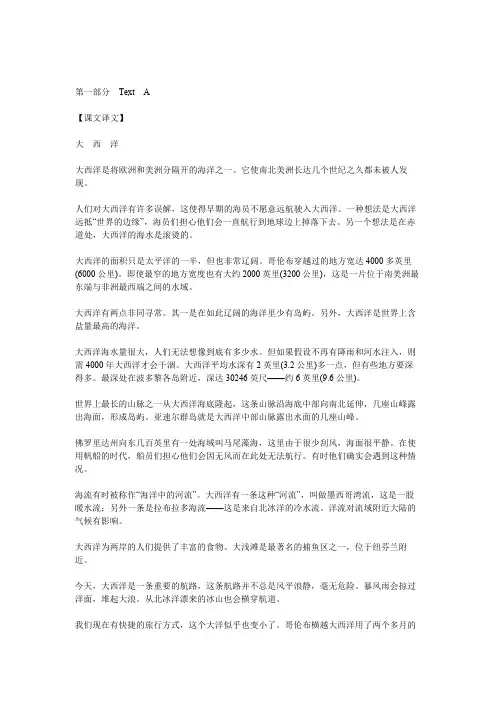
第一部分 Text A【课文译文】大 西 洋大西洋是将欧洲和美洲分隔开的海洋之一。
它使南北美洲长达几个世纪之久都未被人发现。
人们对大西洋有许多误解,这使得早期的海员不愿意远航驶入大西洋。
一种想法是大西洋远抵“世界的边缘”,海员们担心他们会一直航行到地球边上掉落下去。
另一个想法是在赤道处,大西洋的海水是滚烫的。
大西洋的面积只是太平洋的一半,但也非常辽阔。
哥伦布穿越过的地方宽达4000多英里(6000公里)。
即使最窄的地方宽度也有大约2000英里(3200公里),这是一片位于南美洲最东端与非洲最西端之间的水域。
大西洋有两点非同寻常。
其一是在如此辽阔的海洋里少有岛屿。
另外,大西洋是世界上含盐量最高的海洋。
大西洋海水量很大,人们无法想像到底有多少水。
但如果假设不再有降雨和河水注入,则需4000年大西洋才会干涸。
大西洋平均水深有2英里(3.2公里)多一点,但有些地方要深得多。
最深处在波多黎各岛附近,深达30246英尺——约6英里(9.6公里)。
世界上最长的山脉之一从大西洋海底隆起,这条山脉沿海底中部向南北延伸,几座山峰露出海面,形成岛屿。
亚速尔群岛就是大西洋中部山脉露出水面的几座山峰。
佛罗里达州向东几百英里有一处海域叫马尾藻海,这里由于很少刮风,海面很平静。
在使用帆船的时代,船员们担心他们会因无风而在此处无法航行。
有时他们确实会遇到这种情况。
海流有时被称作“海洋中的河流”。
大西洋有一条这种“河流”,叫做墨西哥湾流,这是一股暖水流;另外一条是拉布拉多海流——这是来自北冰洋的冷水流。
洋流对流域附近大陆的气候有影响。
大西洋为两岸的人们提供了丰富的食物。
大浅滩是最著名的捕鱼区之一,位于纽芬兰附近。
今天,大西洋是一条重要的航路,这条航路并不总是风平浪静,毫无危险。
暴风雨会掠过洋面,堆起大浪。
从北冰洋漂来的冰山也会横穿航道。
我们现在有快捷的旅行方式,这个大洋似乎也变小了。
哥伦布横越大西洋用了两个多月的时间,一艘现代化快轮不到4天就可完成这一航程,而乘飞机从纽约到伦敦只用8小时,从南美到非洲只用4小时。
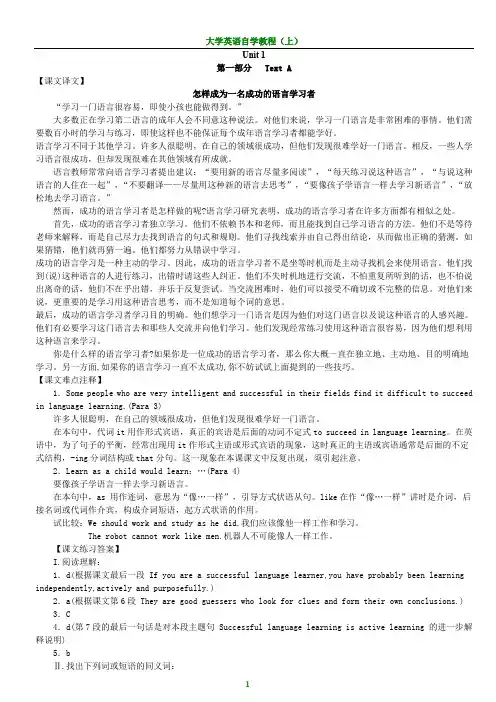
Unit 1第一部分 Text A【课文译文】怎样成为一名成功的语言学习者“学习一门语言很容易,即使小孩也能做得到。
”大多数正在学习第二语言的成年人会不同意这种说法。
对他们来说,学习一门语言是非常困难的事情。
他们需要数百小时的学习与练习,即使这样也不能保证每个成年语言学习者都能学好。
语言学习不同于其他学习。
许多人很聪明,在自己的领域很成功,但他们发现很难学好一门语言。
相反,一些人学习语言很成功,但却发现很难在其他领域有所成就。
语言教师常常向语言学习者提出建议:“要用新的语言尽量多阅读”,“每天练习说这种语言”,“与说这种语言的人住在一起”,“不要翻译——尽量用这种新的语言去思考”,“要像孩子学语言一样去学习新语言”,“放松地去学习语言。
”然而,成功的语言学习者是怎样做的呢?语言学习研究表明,成功的语言学习者在许多方面都有相似之处。
首先,成功的语言学习者独立学习。
他们不依赖书本和老师,而且能找到自己学习语言的方法。
他们不是等待老师来解释,而是自己尽力去找到语言的句式和规则。
他们寻找线索并由自己得出结论,从而做出正确的猜测。
如果猜错,他们就再猜一遍。
他们都努力从错误中学习。
成功的语言学习是一种主动的学习。
因此,成功的语言学习者不是坐等时机而是主动寻找机会来使用语言。
他们找到(说)这种语言的人进行练习,出错时请这些人纠正。
他们不失时机地进行交流,不怕重复所听到的话,也不怕说出离奇的话,他们不在乎出错,并乐于反复尝试。
当交流困难时,他们可以接受不确切或不完整的信息。
对他们来说,更重要的是学习用这种语言思考,而不是知道每个词的意思。
最后,成功的语言学习者学习目的明确。
他们想学习一门语言是因为他们对这门语言以及说这种语言的人感兴趣。
他们有必要学习这门语言去和那些人交流并向他们学习。
他们发现经常练习使用这种语言很容易,因为他们想利用这种语言来学习。
你是什么样的语言学习者?如果你是一位成功的语言学习者,那么你大概一直在独立地、主动地、目的明确地学习。
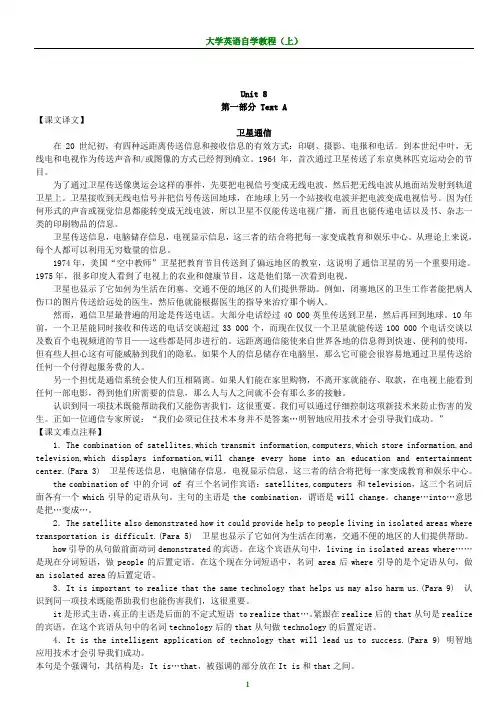
Unit 8第一部分 Text A【课文译文】卫星通信在20世纪初,有四种远距离传送信息和接收信息的有效方式:印刷、摄影、电报和电话。
到本世纪中叶,无线电和电视作为传送声音和/或图像的方式已经得到确立。
1964年,首次通过卫星传送了东京奥林匹克运动会的节目。
为了通过卫星传送像奥运会这样的事件,先要把电视信号变成无线电波,然后把无线电波从地面站发射到轨道卫星上。
卫星接收到无线电信号并把信号传送回地球,在地球上另一个站接收电波并把电波变成电视信号。
因为任何形式的声音或视觉信息都能转变成无线电波,所以卫星不仅能传送电视广播,而且也能传递电话以及书、杂志一类的印刷物品的信息。
卫星传送信息,电脑储存信息,电视显示信息,这三者的结合将把每一家变成教育和娱乐中心。
从理论上来说,每个人都可以利用无穷数量的信息。
1974年,美国“空中教师”卫星把教育节目传送到了偏远地区的教室,这说明了通信卫星的另一个重要用途。
1975年,很多印度人看到了电视上的农业和健康节目,这是他们第一次看到电视。
卫星也显示了它如何为生活在闭塞、交通不便的地区的人们提供帮助。
例如,闭塞地区的卫生工作者能把病人伤口的图片传送给远处的医生,然后他就能根据医生的指导来治疗那个病人。
然而,通信卫星最普遍的用途是传送电话。
大部分电话经过40 000英里传送到卫星,然后再回到地球。
10年前,一个卫星能同时接收和传送的电话交谈超过33 000个,而现在仅仅一个卫星就能传送100 000个电话交谈以及数百个电视频道的节目——这些都是同步进行的。
远距离通信能使来自世界各地的信息得到快速、便利的使用,但有些人担心这有可能威胁到我们的隐私。
如果个人的信息储存在电脑里,那么它可能会很容易地通过卫星传送给任何一个付得起服务费的人。
另一个担忧是通信系统会使人们互相隔离。
如果人们能在家里购物,不离开家就能存、取款,在电视上能看到任何一部电影,得到他们所需要的信息,那么人与人之间就不会有那么多的接触。
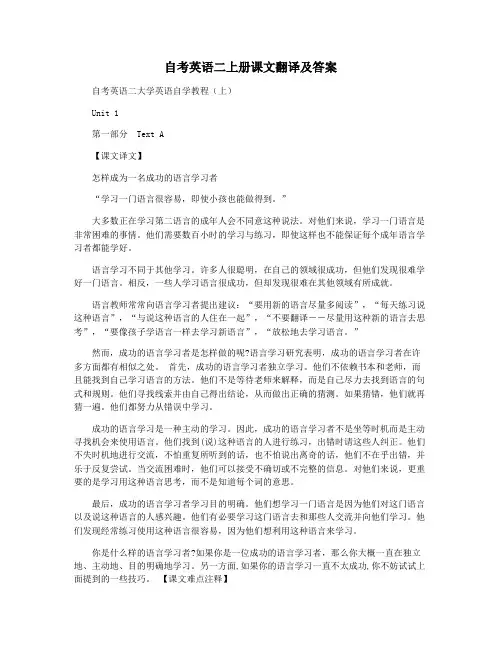
自考英语二上册课文翻译及答案自考英语二大学英语自学教程(上)Unit 1第一部分 Text A【课文译文】怎样成为一名成功的语言学习者“学习一门语言很容易,即使小孩也能做得到。
”大多数正在学习第二语言的成年人会不同意这种说法。
对他们来说,学习一门语言是非常困难的事情。
他们需要数百小时的学习与练习,即使这样也不能保证每个成年语言学习者都能学好。
语言学习不同于其他学习。
许多人很聪明,在自己的领域很成功,但他们发现很难学好一门语言。
相反,一些人学习语言很成功,但却发现很难在其他领域有所成就。
语言教师常常向语言学习者提出建议:“要用新的语言尽量多阅读”,“每天练习说这种语言”,“与说这种语言的人住在一起”,“不要翻译――尽量用这种新的语言去思考”,“要像孩子学语言一样去学习新语言”,“放松地去学习语言。
”然而,成功的语言学习者是怎样做的呢?语言学习研究表明,成功的语言学习者在许多方面都有相似之处。
首先,成功的语言学习者独立学习。
他们不依赖书本和老师,而且能找到自己学习语言的方法。
他们不是等待老师来解释,而是自己尽力去找到语言的句式和规则。
他们寻找线索并由自己得出结论,从而做出正确的猜测。
如果猜错,他们就再猜一遍。
他们都努力从错误中学习。
成功的语言学习是一种主动的学习。
因此,成功的语言学习者不是坐等时机而是主动寻找机会来使用语言。
他们找到(说)这种语言的人进行练习,出错时请这些人纠正。
他们不失时机地进行交流,不怕重复所听到的话,也不怕说出离奇的话,他们不在乎出错,并乐于反复尝试。
当交流困难时,他们可以接受不确切或不完整的信息。
对他们来说,更重要的是学习用这种语言思考,而不是知道每个词的意思。
最后,成功的语言学习者学习目的明确。
他们想学习一门语言是因为他们对这门语言以及说这种语言的人感兴趣。
他们有必要学习这门语言去和那些人交流并向他们学习。
他们发现经常练习使用这种语言很容易,因为他们想利用这种语言来学习。
你是什么样的语言学习者?如果你是一位成功的语言学习者,那么你大概一直在独立地、主动地、目的明确地学习。
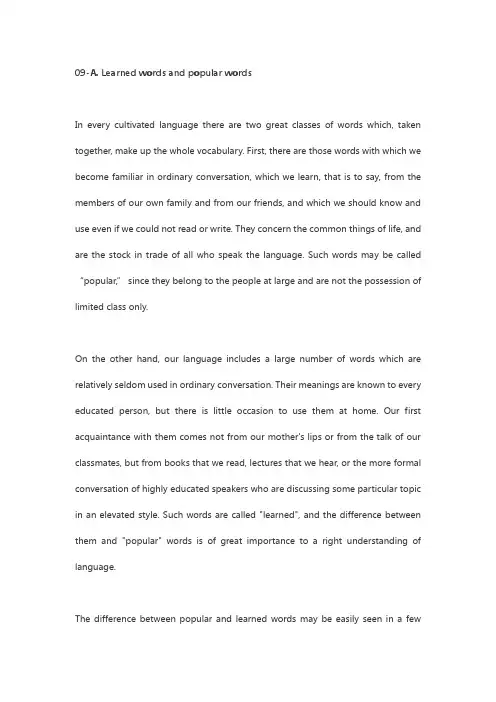
09-A. Learned words and popular wordsIn every cultivated language there are two great classes of words which, taken together, make up the whole vocabulary. First, there are those words with which we become familiar in ordinary conversation, which we learn, that is to say, from the members of our own family and from our friends, and which we should know and use even if we could not read or write. They concern the common things of life, and are the stock in trade of all who speak the language. Such words may be called “popular,” since they belong to the people at large and are not the possession of limited class only.On the other hand, our language includes a large number of words which are relatively seldom used in ordinary conversation. Their meanings are known to every educated person, but there is little occasion to use them at home. Our first acquaintance with them comes not from our mother's lips or from the talk of our classmates, but from books that we read, lectures that we hear, or the more formal conversation of highly educated speakers who are discussing some particular topic in an elevated style. Such words are called "learned", and the difference between them and "popular" words is of great importance to a right understanding of language.The difference between popular and learned words may be easily seen in a fewexamples. We may describe a girl as “lively” or as "vivacious." In the first case, we are using a native English word formed from the familiar noun life. In the latter, we are using a Latin derivative which has exactly the same meaning. Yet the atmosphere of the two words is quite different. No one ever got the adjective lively out of a book. It is a part of everybody's vocabulary. We cannot remember a time when we did not know it, and we feel sure that we learned it long before we were able to read. On the other hand, we must have passed several years of our lives before learning the word vivacious. We may even remember the first time that we saw it in print or heard it from some grown-up friend. Both lively and vivacious are good English words, but Lively is popular and vivacious is learned.The terms "popular" and "learned,” as applied to words, are not absolute definitions. No two persons have the same stock of words, and the same word may be "popular" in one man's vocabulary and "learned in another's. There are also different grades of "popularity." Still, the classification into "learned" and "popular" is convenient and sound. Different opinions may come up as to the classification of any particular word, but there can be no difference of opinion about the general principle. We must be careful, however, to avoid misconception. When we call a word "popular," we do not mean that it is a favorite word, but simply that it belongs to the people as a whole that is, it is everybody's word, not the possession of a limited number. When we call a word "learned” we do not mean that it is used by learned persons alone, but simply that its presence in the English vocabulary is dueto books and the cultivation of literature rather than to the actual needs of ordinary conversation.【课文译文】学术词汇与普通词汇每一种发展起来的语言中都有两大类词汇,这两大类词汇合起来就构成整个词汇。
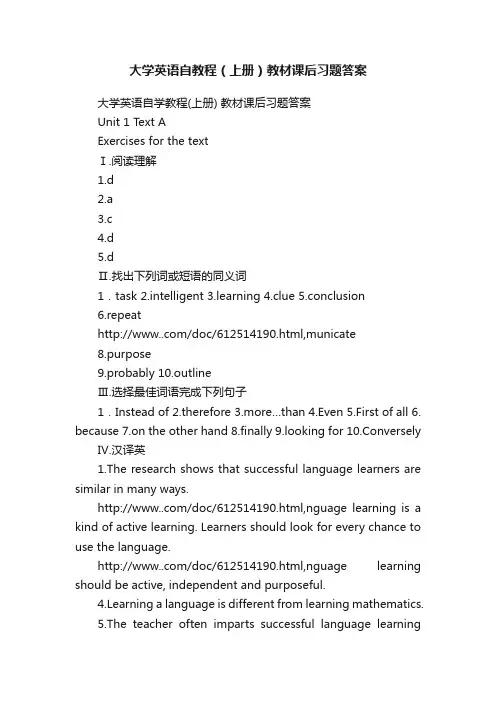
大学英语自教程(上册)教材课后习题答案大学英语自学教程(上册) 教材课后习题答案Unit 1 Text AExercises for the textⅠ.阅读理解1.d2.a3.c4.d5.dⅡ.找出下列词或短语的同义词1.task 2.intelligent 3.learning 4.clue 5.conclusion6.repeat/doc/612514190.html,municate8.purpose9.probably 10.outlineⅢ.选择最佳词语完成下列句子1.Instead of 2.therefore 3.more…than 4.Even 5.First of all 6. because 7.on the other hand 8.finally 9.looking for 10.Conversely Ⅳ.汉译英1.The research shows that successful language learners are similar in many ways./doc/612514190.html,nguage learning is a kind of active learning. Learners should look for every chance to use the language./doc/612514190.html,nguage learning should be active, independent and purposeful.4.Learning a language is different from learning mathematics.5.The teacher often imparts successful language learningexperiences to us. Vocabulary ExercisesⅠ.选择所给单词的适当形式填空,并注意其词性1. a. success b. successful c. successfully2. a. independence b. depend c. dependent3. a. covered b. uncover c. discovered4. a. purposeful b. purposefully c. purposeⅡ.用下列单词的适当形式填空1.inexact 2.technique 3.outlined /doc/612514190.html,municate 5.regularly6. clues7.intelligent8.incomplete9.similar 10.statementⅢ.给下列单词加上前缀构成反义词1.disagree 2.independent 3.incomplete 4.inexact 5.uncover Ⅳ.汉译英1.They find it hard to master a foreign language.2.The research shows that successful men are similar in many ways. 3.Successful language learners do not only depend on books or teachers.4.We are willing to help our friends.5.We should learn new things independently, actively and purposefully.Text BExercises for the text1.T 2. F 3. T 4. F 5. T 6. F 7. F 8. F 9. T 10. F Ⅱ.根据课文填入所缺内容1.with the help of their fingers2.Bring me something to drink3.tea, coffee, wine, beer, soda-water4.put his hands on his stomach5.soda-water6.much more exact7.meanings, put together into sentences8.form new sentences9.can talk10.form new sentences out of the words he knowsVocabulary ExercisesⅠ.从右栏中找出左栏单词的相应释义1.b 2. a 3. c 4. e 5. dⅡ.选择填空1.B 2. A 3. B 4. D 5. A 6. A 7. C 8. C 9. C 10. BGrammar exercisesⅠ.指出下列单词的词性whether连词towards介词second数次hour名词repeat动词successful形容词not副词probably副词than连词because连词which代词even副词intelligent形容词differ动词regular形容词some形容词/代词/副词into介词oh感叹词seem系动词communicate动词Ⅱ.指出下列各句中划线单词的词性1.Let动词round介词2.Fresh形容词for介词3.Leave名词call动词on介词if连词spare动词4.Even副词it代词5.Where连接副词will名词6.After介词calm名词7.seem系动词those代词makes名词(牌子)8.without介词return名词9.strict形容词work动词10.news名词live形容词(现场直播的) meeting名词(会议) Ⅲ.在下列句子的主语和谓语动词下边划线(带“______”为主语,带“_ _ _”为谓语.)3. I had a visit from Mary yesterday.4. China’s stand on this question is clear to all.5. Warm clothes protect against the cold of winter.6. What we need is more practice.7. There doesn’t seem to be much chance of my getting job.8. In those days the cost of living rose by nearly 4 percent.9. There are a number of people interested in the case.10. Every means has been tried but without much result.Ⅳ.指出下列各句中划线单词的成分1.a magazine(宾语);last night(时间状语)2. in need(定语);in deed(状语)3.outside your area(定语);telephoning long distance(主语补足语)4.your children(宾语);all day(时间状语)5.his direction(宾语);French(宾语)6.me(宾语);plenty of exercise(宾语)7.long(状语);to London(地点状语)8.those(宾语);themselves(宾语)9.her(宾语);above others(宾语补足语)10.to built a hotel in the village(定语);of the foreigners(定语)Unit 2 Text AExercises for the textⅠ.阅读理解1.a 2. c 3. a 4. a 5. cⅡ.根据课文完成下列定义1.a certain percentage of the salaries paid to the government.2.the percentage of the tax increases as a person’s income increase.3. people who own a home have to pay taxes on it.4. the tax charged on cars in a city.5. a percentage charged to any item which you buy in that state.Ⅲ.选择适当的词语或短语填空.1.due 2. depends on 3. diverse 4. consists of5. similar6. tends to7. complaining about8. In addition to9. issue 10.agreed onⅣ.从课文中找出合适的动词重新组织下列各句1.How much do you charge for a haircut?2.We are trying to raise the funds for the Red Cross.3.He earned a good reputation for honesty.4.We pay taxes in exchange for government services.5.An open letter protests the government’s foreign policy.Ⅴ.汉译英3.There are three levels of government in the United States; therefore ,there are three types of taxes.4.Some states charge the income tax in addition to the sales tax.5.Americans complain that taxes are too high and the government uses them in the wrong way.Vocabulary ExercisesⅠ.选择所给单词的适当形式填空,并注意其词性1.a. percent b. percentage c. percent2. a. adds b. addition c. additional3. a. confused b. confusing c. confusion4. a. complained b. complain c. complaintⅡ.用下列单词的适当形式填空1. charge2. department3. due4. diverse5. earn6. vary7. property8. leading9. funds 10. tendsⅢ.汉译英1.China leads the world with silk products.2.In addition to income tax, some states charge sales tax.3.The sales tax varies from price to price of any goods you buy.4.People always complain about the constantly rising prices.5.His mother says that he spends too much time in watching TV every day.Text BExercises for the textⅠ.根据课文判断句子正误1. T2. F3. F4. T5. T6. T7. T8. F9. T 10. FⅡ.根据课文填入所缺的内容1.newspapers, magazines, the mail, radio, television2.food, drinks, cars, television sets, furniture, clothing, travel, leisure time activities 3.notice, announcement 4.bright colors, attractive pictures, shorts messages5.color and pictures, voices and music6.15,30,607.entertainment8.want the entertainment9.the audience they want to reach, the best way to get their message to their particular audience, the costs10.managementVocabulary ExercisesⅡ.从课文B中选词填空,其首字母已给出1.attracts 2. leisure 3. available 4. limited 5. estimateⅢ.用下列词或短语的适当形式填空1.Decided on 2. approved 3. estimate 4. carried over 5. put up with 6. characteristic ofⅣ.选词填空1.B 2. C 3. B 4. A 5. C 6. DGrammar exercisesⅠ.在每个句子后边用SV,SVC,SVO,SVOO或SVOC标出其句型1.SV 2.SVO 3.SVOC 4. SVC 5. SVO6. SVOC7.SVOC9.SVOO 10.SVOC11.SVOC 12.SVC 13.SVOC 14.SVOO 15.SVCⅡ.用下列动词的适当形式填空1.prefer 2.insisted 3.need 4.make 5.remember6. look7.worked8.was9.sounds 10.gaveⅢ.选词填空1.B 2. C 3. D 4. A 5. B 6. C 7. A 8. D 9. A 10.DⅣ.用所给句型将下列句子改成英语1.The two language are different/not similar in many ways.2.The deaf and dumb can neither speak nor hear.3.That Englishman can speak Italian very well.4.Would you give me a cup of coffee?5.At this time he felt thirsty and hungry.6.Yesterday evening she asked me to wait for her at the gate of the restaurant. 7.When did you get up this morning?8.The story sounds interesting, but it is not true.9.The meat and macaroni cost me 25 yuan.11.She often teaches the children to sing English songs.Unit 3 Text AExercises for the textⅠ.阅读理解1.d 2. d 3. c 4. b 5. dⅡ.选择下列单词之一填空1.Long/wide 2.deep 3.across 4.around 5.highⅢ.用适当的冠词填空,注意专有名词1.The,/,/ 2.The 3.the,the 4./ 5./,a7./8.The,the,the9.The,the 10./Ⅳ.用所给单词填空1.unwilling 2.average 3.take 4.runs 5.Suppose2.The Atlantic Ocean is only half as big as the Pacific, but it is more than 4,000 miles wide.3.It took him a long time to go to sleep last night.4.There are so many ads on TV that it is hard to remember how many there are. 5.Many wrong ideas made people in Columbus’days unwilling to sail westward.Vocabulary ExercisesⅠ.选择所给单词的适当形式填空,并注意其词性1.a. sailed b. sailor c. sail(n.)2. a. willing b. unwillingly c. unwilling3. a. unusual b. usual c. usually4. a. average(n.) b. average(a.) c. average(v.)Ⅱ.用下列单词的适当形式填空1.peak 2. crew 3. average 4. boils 5. unusual6. highway7. narrow8. salty9.spot 10.affectedⅢ.汉译英1.The sailors were afraid that they might meet with bad weather.2.The mountain is half as high as Mountain Tai.3.There are 45 students in every class of the school on the average.4.Climates affect the growth of plants.5.My work keeps piling up.Text BExercises for the textⅠ.根据课文判断句子正误1.F 2. T 3. F 4. T 5. F 6.T 7. T 8. F 9. F 10. TⅡ.根据课文填入所缺的内容1.Four 2. the earth’s gravitational pull 3. it is so near4. 29.55. its own, reflects6. disc7. the old moon in the new moon’s arms8. outline9. the old earth in the new earth’s arms10. night Vocabulary ExercisesⅠ.从右栏中找出左栏单词的相应释义1.d 2. b 3. a 4. c 5. eⅡ.选词填空1.C 2. C 3. B 4. A 5. D 6. C 7. B 8. B 9. B 10. D Grammar exercisesⅠ.加后缀把下列单词变成名词inform-information move-movementmean-meaning govern-governmentgraduate-graduation similar-similarityconfuse-confusion pay-paymentagree-agreement advertise-advertisement announce-announcement add-additiondecide-decision use-usefulnessattract-attraction mix-mixtureⅡ.加后缀把下列单词变成形容词science-scientific success-successfulresponse-responsible color-colorfulnation-national revolution-revolutionaryaddition-additional help-helpfulperson-personal vary-variouseducation-educational meaning-meaningfulaccept-acceptable use-usefulwood-wooden act-activeⅢ.加前缀把下列单词变成反义词disagree impractical independent uncoverinexact incomplete disorder unhappyinformal impossible inactive uncertaindischarge dishonest impoliteⅣ.指出下列划线单词的意思,并把各句译成中文1.try n. 尝试;试验. 他们经过许多次尝试后终于取得了成功.2. say n. 发言权. 妇女在所有的事务中应享有平等的发言权.3.market v.(在市场上)销售. 3年后他们开始在市场上销售他们的产品. 4.journey v.游历. 要到那儿,他们就不得不踏遍整个山区.5.makes n.牌子;产品. 尽管乍一看我们的产品价格比其他产品的价格要高,可顾客还是愿意买我们的产品.6.Parrot v.鹦鹉学舌般的重复. 老板说什么,他就说什么.7.Wine v.喝酒. 他们吃喝一直到深夜.8.Empty v.流入. 这条小溪流入黄河.9.Head v.作为…之首. 后来,他被任命为经理,主管这家公司.10.Bridge v.越过;跨过(障碍). 这项政策将有助于渡过难关.11.Slow v.使慢下来;减缓. 火车减速一半.12.After-sale a.售后的. 如果你们能提供令人满意的售后服务,那么你的产品可定会在这儿迅速占领市场.13.Machine v.加工. 机床是用来加工金属制品的.14.Take-off n.起飞. 飞机起飞时禁止吸烟.15.Radiocontrol v.无线电控制. 所有模型飞机都是无线电控制的. 16.Downtown a.城市商业区的. 繁忙的商业街或购物中心通常是开餐馆的好场所.17.Will n.意志力;决心. 有志者,事竟成.18.House v.容纳. 据说这套新公寓能住下6口之家.19. water v.淌口水. 看到苹果,他直流口水.Unit 4 Text AExercises for the textⅠ.阅读理解1.c 2. b 3. b 4. d 5. cⅡ.选择适当的形容词填空1. smooth2. similar3. mental4. municipal5. meaningful6. useful7. familiar8. single9. striking 10. difficultⅢ.汉译英/doc/612514190.html,rmation that does not make any sense to you is difficult to remember.2.Association refers to associating what we want to remember with what we havealready remembered.3.Categorizing words can help memory.4.Needless to say, readers could not find the books they wanted if the books in thelibrary were kept in a random order.5.Forming an integrated image with all the information placed in one’s memory.Vocabulary ExercisesⅠ.选择所给单词的适当形式填空,并注意其词性.1.a. psychologist b. Psychology c. psychological2. a. meaningless b. meaning c. meaningful3. a. organized b. organizers c. organization4. a. repeated b. repetition c. repeatⅡ.用下列单词的适当形式填空1.Ability 2. accurately 3. focus4. needless5. meaningful6. random7. Repetition 8. preserve 9. improvement10.image 11.related to 12. associate, withⅢ.把下列名词变成动词1.Mean 2. organize 3. visualize4. associate5. improve6. repeat7. memorize 8. communicate 9. categorize10.imagineⅣ.汉译英1.Their research mainly focuses on the learning skills of adults.2.It is meaningful to know how to use these phrases.3.The adult group consists of fifteen people.4.Needless to say, we all know the facts clearly.5.Memory refers to the ability to remember the past events or experiences.6.I always associate that song with my school life.Text BExercises for the textⅠ.根据课文判断句子正误1.T 2. F 3. T 4.F 5. T 6. F 7. F 8.F 9. F 10. T Ⅱ.根据课文填入所缺的内容1.Eighteen2. repeat it over and over3. a cage; three doors4. wait different intervals5. a random6. reward7. beginning, intermediate, advanced, native-speaking students8.weather,whether,wither,wetter 9. recall, contrast, interrupt, dial10.the meaning of wordsVocabulary ExercisesⅠ.从右栏中找出左栏单词的相应释义1.e 2. b 3. a 4. c 5. dⅡ.从课文B中选词填空,其首字母已给出1.Kept 2. contrast 3. human 4. released 5. intermediate Ⅲ.选择填空1.C 2. D 3. A 4. D 5. BGrammar exercisesⅠ.判断下列句子是陈述句、疑问句、祈使句,还是感叹句1.Declarative sentence2. imperative sentence3. Declarative sentence4. exclamatory sentence5. interrogative sentence6. exclamatory sentence7. imperative sentence 8. declarative sentence9. declarative sentence 10. imperative sentenceⅡ.把下列句子变成一般疑问句1.Did he attend the English lecture yesterday? 2.Was it still raining when you came in?3.Is there anyone in the house?4.Was the baby well looked after?5.Do you usually get up early in the morning? 6.Do you like to study in the reading room? 7.Can he tell you the result next week?8.Was she able to swim across the lake?9. Will it be good weather tomorrow?10 .Did Mr. Brown lose his job again?Ⅲ.就划线部分提问1.Where is the post office?2.When did Tom graduate from college?3.How does he study French?4.Who lost the key to the door?5.Why did Miss Lee feel very bad?6.What are listed in the telephone book? 9.What did he advise you to go?10.Why did he come?Ⅳ.汉译英1.She disagrees on many issues with her husband. 2.Could you talk about the problem about taxes? 3.Please bring me a glass of beer.4.Your uncle never says anything at home, does he? 5.What are the customers complaining about?6.Did he travel in France or in Italy last summer?7.Did he see the ad in a newspaper or in a magazine?8.Do you have to pay sales tax when buying something?9.Who is responsible for the company’s advertising?10.At that time many salaried people did not support the federal government, did they?Unit 5 Text AExercises for the textⅠ.阅读理解1. b2. d3. d4. c5. cⅡ.从课文中找出下列单词或短语的同义词1.Bravery 2. eager 3. civilized 4. overseas5. substitute6. foundation7. mixture8. belief9. protein 10. containⅢ.用括号中的所给名词的复数形式填空1.Pianos,violins2.firemen3.data4.deer5. potatoes, tomatoesⅣ.汉译英1.During World War Ⅱ,the soldiers ate a large amount of potatoes.2.There is a fallacy that eating an animal one can get the good qualities of that animal for himself.3.It has yet to be proved whether fish is the best brain food.4.Milk contains rich proteins, so many people have it for breakfast.5.Today many people have wrong ideas about some foods.Vocabulary ExercisesⅠ.选择所给单词的适当形式填空,并注意其词性1.a. civilize b. civilized c. civilization2. a. free b. freedom c. freely3.a.digest b. digestible c. digestion d. digestive, digestible4. a. scientists b. scientific c. scienceⅡ.用下列单词的适当形式填空1.Mixture 2. poisonous 3. suppose 4. digestⅢ.给出下列单词的名词形式1.Digestion2.mixture3.belief4.civilization/doc/612514190.html,binationⅣ.汉译英1.We have not found a substitute for him yet.2.Children are eager to become as strong and brave as the heroes in the moves. 3.He is supposed to be the fastest runner among us.4.Some stories are widespread, while others are not.5.As a matter of facts, meat and potatoes can be eaten together.6.People often think of a school as a small society.Text BExercises for the textⅠ.根据课文判断句子正误1.T 2. F 3. T 4. F 5. T 6. T 7. T 8. T 9. F 10. T Ⅱ.根据课文填入所缺的内容1.True 2. run races, wrestle, have mock fights together3. Frogs, owls4.sports,very grave5.dams6.take care of sheep7.make changes and improvements 8.fashions,none from each other9.methods 10.instinct 11.ant,frog,owl,beaver,parrot,horse,dog,Elephant, sheep, spiderVocabulary ExercisesⅠ.从右栏找出左栏单词的相应释义1.d 2. c 3. b 4. a 5. eⅡ.选择填空1.D 2. A 3. C 4. D 5. D 6. D 7. A 8. B 9.B 10.CGrammar exercisesⅠ.指出下列句子是简单句、并列句还是复合句Simple sentences are 6,8,10Compound sentences are 2,4,7,9Complex sentences are 1,3,5Ⅱ.选择填空1. B2. D3. D4. C5. B6. A7.C8.C9.D 10.AUnit 6 Text AExercises for the textⅠ.阅读理解1.Rare 2. substance 3. slight 4.pressure 5.crystal6. crack7. gem8. elevator9. crush 10. pebbleⅢ.用“It is”或“It was”把下列句子改成被动句1.It was thought that the earth was flat.2.It is reported that a new government has been formed.3.It was believed that the sun travelled around the earth.4.It is believed that living things exist on Mars.5.It is said that the world temperature is growing higher.Ⅳ.选择适当的短语完成下列句子1.Stick to 2. change…into 3. stick to4. running out5. pick up6. changed into7. run out 8. picked up 9. sorting out10.sort outⅤ.汉译英1.It is known to all that diamond are the hardest substance.2.Today most diamonds are not found in streambeds but mined from rock formations deep inside the earth.3.Diamonds, as they are first mined, do not look veryimpressive.4.He never sticks to anything he does.5.The explosion of active volcanoes is a kind of horrible natural phenomenon.Vocabulary ExercisesⅠ.选择所给单词的适当形式填空,并注意其词性1.a. popularity b. popularize c. popular2. a. hand(n.) b. hand(vt.) c. handful(n.)3. a. formed b. formation c. forms4. a. impression b. impressive c. impressedⅡ.用所给单词的适当形式填空1.experienced 2. Extreme 3. formation4. pressure5. blasted6. handful7. crystal 8. destroyed 9. unusual10.flowⅢ.汉译英1.Please sort out what you want and throw the rest away.2.The price of the elevator is somewhat higher than expected.3.These designs are very popular with young people.4.He stopped writing,for his pen had run out of ink.5.Experienced people can tell which one is real immediately.Text BExercises for the textⅠ.根据课文判断句子的正误1.difficulty 2. the thin blue haze 3. magnifying glass4. do,be5. guessing6. vegetable7. come first,a higher order of beings 8. earth,air9. flowers,fruits,grain 10.dissolvesVocabulary ExercisesⅠ.从右栏中找出左栏单词的相应释义1.d 2. b 3. a 4. c 5. eⅡ.从课文B中选词填空,其首字母已给出1.puzzled 2. dissolve 3. aside4. magnifying5. latter6. observes7. beneath 8. broadGrammar exercisesⅠ.用括号中所给动词的限定时态填空,并将各句译成汉语1.died 父亲去世时汤姆才23岁.2.does not guarantee 对成年人学习语言来说,单靠练习不能保证成功. 3.advised 他建议儿子到30岁再结婚.4.is looking 她正在找机会,心爱那个和他谈一谈.5.comes 还没轮到你的时候你先等着.6.was going 他正要离开饭店的时候经理进来了.7.will have left 快点!否则,我们到火车站时火车就要开走了.8.would help 她说第二天要帮助她丈夫洗车.9.will be sitting 明天的这个时候他们将坐在电影院里了.10.w ere playing 男孩们透过窗户看见一些小象在外面玩耍.11.w ill go 100年之后,人们将会到其他的星球上度假.12.h ad finished 他吃完早饭就去售票处.13.w ould be 最后她终于认识到应该考虑一下出国的费用.14.w ill have locked 快点!要不然他们锁了门你就进不去了.15.h ad been getting 他认为最近一段时间天气变得相当好.16.h ad been keeping 我只想让你知道你一直让我们睡不着觉.17.h ad happened 几乎过了一个星期后,那个女孩才说清楚所发生的一切. 18.w ill tell 当你问她时,她就会把这个消息告诉你.19.h ad finished 我还没有吃完早饭,约翰就打电话来说要来看我.20.h as passed,failed 乔治通过了驾车考试,可没有通过学校考试.Ⅱ.选择填空1.B 2. B 3. D 4. D 5. B 6. B 7. D 8. A 9. D 10. A Ⅲ.用括号中所给动词的适当时态填空1.invented 2. offer 3. have been sitting4. brought5. has not paid6. had seen7. was making 8. has been working 9.am preparing10.has happenedⅣ.汉译英3.Where are you going to hang the picture?4.She fell down when she was going downstairs.5.For how many years has Henry been learning to cook from Miss Smith? 6.The history teacher said that World War Ⅰcame to an end in 1918.7.Mary has been waiting for you since this morning.8.My elder sister told me that the performance was not interesting at all.9.If you come at 8:00 tomorrow morning, you will see him in the office. 10.-Have you seen the movie?-Yes, I saw it in Nanjing.Unit 7 Text AExercises for the textⅠ.阅读理解1. b2. b3. d4. b5. cⅡ.从课文中找出下列单词的反义词1.divorce 2. single 3. extended4. together5. traditional6. increase7. result 8. love 9. earn 10. oftenⅢ.用所给单词的适当形式填空1.basically 2. Traditionally 3. extended4. divorced5. related6. relative7. industrial 8. industrialized 9. nuclear 10. nucleusⅣ.汉译英1.There are many single parent families and remarried families in the US 2.Undoubtedly, the members of an extended family are related by blood or by marriage.3.The nuclear family in China usually consists of mother, father and their only child.4.The family has a sense of belonging, whether to the young or to the old. 5.Most children are unwilling to live with their parents when they grow up. Vocabulary Exercises Ⅰ.选择所给单词的适当形式填空,并主语其词性1.a. relatives b. relation c. relate2. a. extension b. extensive c. extended3. a. tradition b. Traditionally c. traditional4. a. industrialized b. Industrial c. industryⅡ.用下列词的适当形式填空1. relatives2. extend3. marriage4. descended5. nucleus6. traditional7. social8.definition9. security 10. basicallyⅢ.汉译英3.Traditionally, Chinese youth live with their parents until they grow up and marry.4.All the teachers care for the progress in my study.5.In some families, both parents work and take care of their family and children as well.6.The group was spilt up into two because it was too large.7.They plan to extend their study in this field.8.She divorced her husband two years ago.Text BExercises for the textⅠ.根据课文判断句子正误1.F 2. F 3. T 4. F 5. T 6. F 7. T 8. T 9. F 10. TⅡ.根据课文填入所缺内容1.equal 2. physical and emotional 3. nuclear 4. worked outside the home 5. the housework, preparation 6.her first years of marriage 7. busier 8. the family has two incomes 9. child care center, baby-sitter 10. get ready for school, make their breakfast Vocabulary ExercisesⅠ.选择填空1.D 2. A 3. B 4. C 5. DⅡ.从课文B中选词填空,其首字母已给出1.dependent 2. primary 3. structured 4. similarities5. role6. partners7. customaryGrammar exercisesⅠ.根据限定时态,用括号里所给的被动语态填空1.are being printed 2. are guaranteed3. will be pulled4. were developed5. will be built6. was praised7. has been translated 8. had been sent9. would be given 10. is being doneⅡ.用被动语态改写下列各句,省去划线的单词1.All the books are kept in good order in the library.2.The income tax was graduated from 14 to 70 percent in the 1960’s.3.We sometimes can be persuaded to buy things that are not necessary. 4.What should be done in a case like this?5.It has been announced that only three of us will be invited to the party. 6.The meeting will be put off till next Monday.7.You are not allowed to smoke in the laboratory.10.Your baby will be looked after at the day-care center.Ⅲ.用下列各句括号中所给动词的适当形式填空1. is spoken2. can not be kept3. was turned off4. were believed5. should not be eaten6. were let out7. were taken care of 8. can be remembered9. would be becalmed 10. are lighted upⅣ.用被动结构将下列句子译成英语1.Was the United Nations established in 1945?2.It is said that he has been seriously injured.3.This building will be designed by Dr.Ford. 4.Where was the last meeting held?5.Was America discovered by Columbus in 1492? 6.This task must be fulfilled by you.7.The patient should be treated carefully.8.She was given a warm welcome at the railway station. 9.He is called Lao Wang ,though he is not old at all. 10.The gate had been closed when I came back.Unit 8 Text AExercises for the textⅠ.阅读理解1. c2. a3. b4. d5. dⅡ.找出下列单词或短语的同义词1.transmit2.access3. remote4.demonstrate5.instruction6. simultaneously7.travel8. available9.privacy 10. application Ⅲ.从课文选出单词或短语完成下列各句1.television broadcasts, telephone calls; printed materials 2.an education and entertainment center3.transmits, stores, displays4.telephone calls5.a risk to our privacyⅣ.介词填空1.over2. via3. to4. of5. for6. at7. on8. to9. from 10. betweenⅤ.汉译英1.The information stored in computers can be transmitted via satellite to users.2.Now a satellite is capable of receiving and transmitting 100,000 telephonecalls simultaneously.3.The high and new technology may help us and also harm us.4.To meet the 21st century, it is important for us to learn to use computer.5.The goal of learning a new technology is to apply it.Ⅰ.选择所给单词的适当形式填空,并主语其词性1. a. established(v.) b. established(a.) c. establishment2. a. signal(v.) b. signal(n.) c. sign3. a. entertainment b. entertainer c. entertains4. a. limited b. limit, limit c. unlimitedⅡ.用下列词的适当形式填空1. displayed2. theory3. established4. remote5. visual6. signaled7.access8. channel9.transmitted 10. transportation Ⅲ.汉译英1.Satellites are capable of transmitting not only television broadcasts but alsotelephone calls.2.In theory, every person has access to education.3.You should follow the do ctor’s instructions on how to take the medicine./doc/612514190.html,puter systems can transmit sound as well as pictures simultaneously.5.It is modern technology that leads us to success.6.The patient should be isolated from the rest.7.The soldier displayed his courage and skills.8.His experiment has fully demonstrated the psychological principle.Text BExercises for the textⅠ.根据课文判断句子正误1.F 2. T 3. T 4. T 5. F 6. F 7. T 8. T 9. T 10. FⅡ.根据课文填入所缺内容1.Where2.deadly3.2,000pounds4.the coal, oil, and gas we have on earth5.our bodies6.powerful current of electrical energy7.the electric energy8.the energy in the atmosphere9.automobiles ,airlines, factories, atomic explosions10.l earn how to protect our atmosphere, the roof over the world of manVocabulary ExercisesⅠ.从右栏中找出左栏单词的相应释义1.d 2. c 3. b 4. e 5. aⅡ.从课文B中选词填空,其首字母已给出1.atmosphere2. existence3. thorough4. radar5. elements6. protect,from7. created8. rest onⅠ.在下列各句中的不定式下划线,并指出其语法功能(注:这里的动词不定式都已给出)1.to say you like it (主语)2.to discover the secret(结果状语)3.how to make use of the waste paper(宾语)4.to tell the difference between the two(主语)5.not to miss the train(目的状语)6.to improve the present economic situation(定语) 7.To be a teacher of the people(目的状语)8.(to)grow (宾补)9.to write a story(宾语)10.(to)be treated in that way(宾补)11.to make such an experiment(定语)12.to take care of so many children (主语)13.to hear her(原因状语)talk like that(宾补)14.to be very interesting(主补)15.to be waiting for us (宾补)16.to be discussed today(定语)how to divide the work(表语)17.to attend the meeting(主补)to be held(定语)18.to have seen your performance(原因状语)19.to learn new words(目的状语)20.to build their houses(主补)Ⅱ.用括号中所给动词的不定式的适当形式填空1.to drive2. to take3. to be praised4. ring5. to go6. to be invited7. to be sent, to work 8. take 9. to have heard 10. to learn Ⅲ.汉译英,划线动词用不定式形式1.He has his own method to learn a foreign language.2.Sometimes it is necessary for us to learn from mistakes.3.She decided to leave the hotel at 3:00 p.m.4.He is said to have a bright future.5.Many peasants left their hometowns for Beijing to look for job.6.It took Columbus more than two months to sail across the Atlantic.7.Do you have any question to ask?8.The room is not big enough to hold so many people.9.In the traditional family, the mother’s role is to look after children.10.S he is too young to understand these things.Unit 9 Text AⅠ.阅读理解1. c2. a3. d4. b5. aⅡ.找出下列单词或短语的同义词1. concern2. possession3. occasion4. acquaintance5. lively6. grown-up7. classification8. principle9. convenient 10. presence Ⅲ.用适当的情态动词填空1.ought。
大学英语自学教程(上册)unit23课文译文参考大学英语自学教程(上册) unit 23 课文译文参考大学自学教程(上册) unit 23 非言语交际23-A. Non-verbal CommunicationIf anyone asked you what were the main means of communication between people, what would you say? That isn’t a catch question. The answer is simple and obvious. It would almost certainly refer to means of communication that involve the use of words. Speakers and listeners-oral communication, and writers and readers-written communication. And you’d be quite right. There is, however, another form of communication which we all use most of the time, usually without knowing it. This is sometimes called body language. Its more technical name is non-verbal communication. Non-verbal, because it does not involve the use of words. NVC for short.When someone is saying something with which he agrees, the average European will smile and nod approval. On the other hand, if you disagree with what they are saying, you may frown and shake your head. In this way you signal your reactions, and communicate them to the speaker without saying a word. I referred a moment ago to "the average European”, because body language is very much tied to culture, and in order not to misunderstand, or not to be misunderstood, you must realize this.A smiling Chinese, for instance, may not be approving but somewhat embarrassed.Quite a lot of work is now being done on the subject of NVC, which is obviously important, for instance, to managers, who have to deal every day with their staff, and have to understand what other people are feeling if they are to create good workingconditions. Body language, or NVC signals, are sometimes categorized into five kinds: 1.body and facial gestures; 2.eye contact; 3.body contact or "proximity"; 4.clothing and physical appearance; and 5.the quality of speech. I expect you understood all those, except perhaps "proximity." This simply means "closeness". In some cultures-and I am sure this is a cultural feature and not an individual one-it is quite normal for people to stand close together, or to more or less thrust their face into yours when they are talking to you. In other cultures, this is disliked; Americans, for instance, talk about invasion of their space.Some signals are probably common to all of us. If a public speaker (like a professor, for example) is all the time fiddling with a pencil, or with his glasses, while he is talking to you, he is telling you quite clearly that he is nervous. A person who holds a hand over his mouth when he is talking is signaling that he is lacking in confidence. If you start wriggling in your chairs, looking secretly at your watches or yawning behind your hands, I shall soon get the message that I’m boring you. And so on. I'm sure you could make a whole list of such signals-and it might be fun if you did.All the signals I have mentioned so far can be controlled. If you are aware that you are doing these things, you can stop. You can even learn to give false signals. Most public speakers are in fact nervous, but a good speaker learns to hide this by giving off signals of confidence. Other kinds of NVC are not so easy to control. Eye contact, for instance. Unless you are confessing intense love, you hardly ever look into someone else’s eyes for ve ry long. If you try it, you’ll find they will soon away, probably in embarrassment.I’ve already mentioned proximity, so just a brief word now about our last two categories, which concern the way people dress and the way they speak. These are both pretty obvious signals. People may dress casually and speak casually, which signals that they are relaxed. Or they can dress formally and speak formally, showing their tenseness. In fact, non-verbal communication can, as the saying goes, speak volumes.【课文译文】非言语交际如果有人问你人与人之间最主要的交际手段是,你会怎么说?这倒不是一个难以回答的问题。
自考英语一课后翻译句子上册Unit 11. 他们发现要掌握一门外语是困难的。
(find it hard to)They find it hard to master a foreign language.2.这项研究表明成功人士在许多方面是相似的。
(similar)The research shows that successful people are similar in many ways.3.成功的语言学习者不只依赖书本或者教师。
(depend on) Successful language learners do not just depend on books or teachers.4.我们愿意帮助我们的朋友。
(be willing to)We're willing to help our friends.5.我们应该独立地,积极地并且有目的地学习新东西。
( purposefully) We should learn new things independently, actively and purposefully. Unit 21.中国以其丝绸产品领先于世界。
(lead…with)China leads the world with its silk products.2.除了收入所得税外,有些州还要收购物税。
(in addition to, charge) Some states charge a sales tax in addition to income tax.3.销售税随你所购物品的价格而变。
(vary with)Sales tax varies with the prices of the goods you buy.4.人们总是在抱怨着不断上涨的物价。
(complain about)People are always complaining about the rising prices.5.妈妈说他每天花太多的时间看电视。
大学英语自考教程上册A课文中英对照17-18(总4页)--本页仅作为文档封面,使用时请直接删除即可----内页可以根据需求调整合适字体及大小--17-A. Panic and Its EffectsOne afternoon while she was preparing dinner in her kitchen, Anne Peters, a 32-year-old American housewife, suddenly had severe pains in her chest accompanied by shortness of breath. Frightened by the thought that she was having a heart attack, Anne screamed for help. Her husband immediately rushed Anne to a nearby hospital where her pains were diagnosed as having been caused by panic, and not a heart attack.More and more Americans nowadays are having panic attacks like the one experienced by Anne Peters. Benjamin Crocker, a psychologist at the University of Southern California, reveal that as many as ten million adult Americans have already experienced or will experience at least one panic attack in their lifetime. Moreover, studies conducted by the National Institute of Mental Health in the United States disclose that approximately million adult individuals are currently suffering from severe and recurrent panic attacks.These attacks may last for only a few minutes; some, however, continue for several hours. The symptoms of panic attacks bear such remarkable similarity to those of heart attacks that many victims believe that they are indeed having a heart attack.Panic attack victims show the following symptoms: they often become easily frightened or feel uneasy in situations where people normally would not be afraid; they suffer shortness of breath, experience chest pains, a quick heartbeat, sudden fits of trembling, a feeling that persons and things around them are not real; and most of all, a fear of dying or going crazy, A person seized by a panic attack may show all or as few as four of these symptoms.There has been a lot of explanations as to the causes of panic attacks. Many claim that psychological stress could be a logical cause, but as yet, no evidence has been found to support this theory. However, studies show that more women than men experience panic attacks and people who drink a lot as well as those who use drugs are more likely to suffer attacks.It is reported that there are at least three signs that indicate a per-son is suffering from a panic attack rather than a heart attack. The first is age. People between the ages of 20 and 30 are more often victims of panic attacks. The second is sex. More women suffer from recurrent panic attacks than men. The third is the multiplicity ofsymptoms. A panic attack victim usually suffers at least four of the previously mentioned symptoms, while a heart attack victim often experiences only pain and shortness of breath.It is generally agreed that a panic attack does not directly endanger a person's life. All the same, it can unnecessarily disrupt aperson's life by making him or her so afraid of having a panic attack in a public place that he or she may refuse to leave home and may eventually become isolated from the rest of society. Dr. Crocker’s advice to any person who thinks he is suffering from a panic attack is to consult a doctor for a medical examination to rule out the possibilities of physical illness first. Once it has been confirmed that he or she is, in fact, suffering from a panic attack, the victim should seek psychological and medical help.【课文译文】恐慌症及其影响一天下午,安妮•彼得斯,一位32岁的美国家庭主妇,正在厨房准备晚饭的时候,突然胸口一阵剧烈的疼痛,伴着呼吸急促。
15-A. How TV Violence Affects KidsFor more than a quarter of a century, evidence has been increasing that children's exposure to violence on television has long-lasting, effects on their behavior. Between 1982 and 1986, the amount of television time allocated each week to violent programs increased significantly. And the number of violent acts on television in the past years has increased from about 19 to 27 per hour. Given the amount of time that children watch television, it has become one of the most powerful models they want to follow. The Position Statement on Media Violence in Children's Lives, recently adopted by the National Association for the Education of Young Children, points out that preschool children are particularly easily affected by the media because they are not yet fully able to distinguish fantasy from reality and their understanding of the underlying motives for behavior and the subtleties of moral conflicts is not yet well developed. For example, the rapid recoveries of people on TV from violent attacks give children an unrealistic picture of the injuries that have been suffered.Effects on PlayChildren naturally often want the toys shown on and advertised during these programs. And with these toys, their play tends to be more imitative than imaginative. Children simply imitate the behavior observed during the program,thus undermining both the imaginative and the expressive functions of play. The narrow range of most violence-related toys advertised on television jeopardizes the role of play in helping children make better sense of their own feelings and interpret their world. Some research even suggests that children apply the behaviors observed on TV programs to their real-life situations.Parents Can HelpIt is a good idea for parents to monitor the amount as well as the kind of television their preschool child watches. If your child appears to be crazy about war play and weapons, it would be a good idea to control his viewing. Controlling viewing is easier to do during the preschool years than during the school years, so you should initiate a pattern of restricted television watching now.Help your child to interpret what she sees - to think of explanations for the events depicted and to imagine how the show is put together. Make simple critique of a show without implying that her fascination with the drama and the weapons makes her guilty by association.Ask the teachers of your child's preschool about their policy on war play and toy weapons. Many preschool teachers do not like to have commercially made toy weapons brought into the classroom and welcome hearing your concerns aboutthis matter. Look for other parents who share your views. Work together to control the amount of violent programs watched and the number of violent toys found in the home. Try to arrange play dates for the children as an alternative to TV viewing. Or look for videos of healthy, nonviolent programs for children, and encourage their use as an attractive alternative to violent television programs.【课文译文】电视暴力片对孩子的影响近25年多来,愈来愈多的证据表明,孩子接触电视中的暴力镜头,对他们的行为有着持久的影响。
Unit 1第一部分Text A【课文译文】怎样成为一名成功的语言学习者“学习一门语言很容易,即使小孩也能做得到。
”大多数正在学习第二语言的成年人会不同意这种说法。
对他们来说,学习一门语言是非常困难的事情。
他们需要数百小时的学习与练习,即使这样也不能保证每个成年语言学习者都能学好。
语言学习不同于其他学习。
许多人很聪明,在自己的领域很成功,但他们发现很难学好一门语言。
相反,一些人学习语言很成功,但却发现很难在其他领域有所成就。
语言教师常常向语言学习者提出建议:“要用新的语言尽量多阅读”,“每天练习说这种语言”,“与说这种语言的人住在一起”,“不要翻译——尽量用这种新的语言去思考”,“要像孩子学语言一样去学习新语言”,“放松地去学习语言。
”然而,成功的语言学习者是怎样做的呢?语言学习研究表明,成功的语言学习者在许多方面都有相似之处。
首先,成功的语言学习者独立学习。
他们不依赖书本和老师,而且能找到自己学习语言的方法。
他们不是等待老师来解释,而是自己尽力去找到语言的句式和规则。
他们寻找线索并由自己得出结论,从而做出正确的猜测。
如果猜错,他们就再猜一遍。
他们都努力从错误中学习。
成功的语言学习是一种主动的学习。
因此,成功的语言学习者不是坐等时机而是主动寻找机会来使用语言。
他们找到(说)这种语言的人进行练习,出错时请这些人纠正。
他们不失时机地进行交流,不怕重复所听到的话,也不怕说出离奇的话,他们不在乎出错,并乐于反复尝试。
当交流困难时,他们可以接受不确切或不完整的信息。
对他们来说,更重要的是学习用这种语言思考,而不是知道每个词的意思。
最后,成功的语言学习者学习目的明确。
他们想学习一门语言是因为他们对这门语言以及说这种语言的人感兴趣。
他们有必要学习这门语言去和那些人交流并向他们学习。
他们发现经常练习使用这种语言很容易,因为他们想利用这种语言来学习。
你是什么样的语言学习者?如果你是一位成功的语言学习者,那么你大概一直在独立地、主动地、目的明确地学习。
《大学英语自学教程》(上)课后练习例句汉译英(汉英对照)1 研究表明,成功的语言学习者在许多方面有共同之处。
Research shows that the successful language learners are similar in many ways.2 语言学习是一种主动的学习,学习者应该利用一切机会运用语言。
Language learning is an active learning; learners should take every chance to use the language.3 学习语言应该主动地独立地有目的的学。
We should learn language independently, actively and purposefully.4 学语言不同于学数学。
Learning language is different from learning maths.5 老师经常将成功的语言学习经验传授给我们。
Teachers often offer successful experience of language learning to us.6 他们发现要掌握一门外语是困难的。
They found that it is difficult to learn a foreign language.7 这项研究表明成功人士在许多方面是相似的。
This research shows that the successful people are similar in many ways.8 成功的语言学习者不只依赖书本或教师。
Successful language learners don’t only depend on th e book or the teacher.9 我们愿意帮助我们的朋友。
We are willing to help our friends. ♫10 我们应该独立地积极地并且有目的地学习新东西。
We should learn new things independently, actively and purposefully.11 纳税是每个公民应尽的义务。
Paying taxes is every citizen’s obligation.12 美国人常说他们一生中有两件事逃脱不了。
American often says that there are two things a person can be sure of in life.13 正因为美国有三级政府,税收也有三种。
It is because there three levels of government in the United States, there are three types of taxes. 14 某些州除了征收销售税外还征收收入所得税。
Some states charge income tax in addition to sales tax.15 美国人抱怨税收太高,政府也没有正确使用税收。
Americans complain that the taxes are too high and the government uses their tax dollars in the wrong way.16 中国以其丝绸产品领先于世界。
China leads the world with silk products.17 除了收入所得税外,有些州还要收购物税。
In addition to income tax, some states charge sales tax.18 销售税随着你所购物品的价格而变Sales tax varies with the prices of what you buy.19 人们总是抱怨着不断上涨的物价。
People are always complaining about the rising price.20 妈妈说他每天花太多的时间看电视。
Mother said that he spent too much time o n the TV every day. ♫21 这两种语言在许多方面都不一样。
The two languages are different from each other in many ways.22 聋哑人即不会说也能听。
Deaf and dumb people can neither speak nor hear.23 那个英国人意大利语说得非常好。
That Englishman could speak Italian very well.24 请递给我一杯咖啡好吗?Would you hand me a cup of coffee?25 这个时候他感到又渴又饿。
At that time he was both thirsty and hungry.26 昨晚他叫我在饭馆门口等她。
Yesterday evening she let me wait for her at the gate of the restaurant.27 你今天早晨什么时候起床的?When did you get up this morning?28 这个故事听起来很有趣,但它不是真实的。
This story sounds very interesting, but it is not real.29 这些肉和通心粉花了我25块钱。
Those meat and macaroni cost me 25 Yuan.30 她经常教这些孩子唱英文歌曲。
She often teaches these children to sing English song. ♫31 平均每天有1000名来访者。
On the average, there are 1000 visitors every day.32 大西洋只有太平洋的一半大,但有4000多英里宽。
The Atlantic Ocean is only half as big as the Pacific Ocean. But it is more than 4000 miles wide.33 昨晚他过了好一会才入睡。
It was a long time before he fell asleep last night.34 电视里的广告太多,无法记住到底有多少。
There are so many advertis ing on TV that we can’t exactly remember how many.35 许多错误的想法导致哥伦布时代的人不愿西行。
Much wrong idea made sailors of Columbus’s time unwilling to sail to the west.36 水手们担心他们会遇上坏天气。
The sailors were afraid to meet the bad weather.37 这座山有泰山的一半高。
The mountain is half as high as Tai mountain.38 这所学校平均每个班有45人。
On the average there are 45 students in each class of this school.39 气候对植物的生长有影响。
Climate affects the growing of plants.40 我的工作越积越多。
My work is pilling up. ♫41 你难以记住毫无意义的词。
A word that doesn’t make any sense to you is difficult to remember.42 联想旨在将我们要记住的与已记住的信息联系在一起。
Association refers to associating the material we want to remember with something we rememberaccurately.43 将单词分类有利于记忆。
Categorizing the words is helpful to remember.44 不用说,如果图书馆里的书陈列得毫无章法,读者不可能找到他们所要的书。
Needless to say, if the book in the library is kept in random order, it is impossible for the readers to find what they want.45 将信息处理为一幅完整的画面存放在脑海里,可以帮助保持记忆。
Forming an integrated image with all the information placed in a single mental picture can help us to preserve a memory.46 他们的研究主要集中在成年人的学习技能上。
Their research focuses on the learning techniques of grown up.47 知道这些短语怎么用是很有意义的。
It is meaningfulness to know how to use these phrases.48 成年级由15人组成。
The adult group consists of 15 persons.49 不用说,我们大家都很清楚这些事实。
Needless to say, we are all clear these facts.50 记忆力指的是记住过去的事件和经历的能力。
Memory referees to the ability to remember the past things and experiences.51 我总是把那支歌和我的学校生活联系起来。
I often associate that song with my school life. ♫52 她与丈夫在许多方面不一致。
She disagreed with her husband on many ways.53 你能不能谈谈有关税收方面的问题。
Would you say something about taxes?54 请给我来一杯啤酒。
Please give me a glass of beer.55 你叔叔在家里一句话也不说,是不是?Your uncle says nothing at home, doesn’t he?56 这些顾客在抱怨些什么?What are the customers complaining about?57 去年夏天他是在法国还是在意大利旅行?Did he travel in France or in Italy last summer?58 你是在报纸上还是杂志上看到这个广告的?Did you see the advertising in the newspaper or in the magazine?59 你购买东西时要交销售税吗?Do you pay sales tax when you buy something?60 谁负责公司的广告业务?Who is responsible for advertising business of the company?61 那时候许多挣工资的人都不支持联邦政府,是不是?At that time, many salaried people didn’t support the federal government, did they?62 第二次世界大战期间的士兵吃了大量的土豆。